#I know it’s supposed to be up to interpretation if he’s a slave to fate or actually choosing his own path but
Text
Due to circumstances irl me and my friends still won’t be able to finish new getter watch which fuck knows when it’ll be resume now and one of the factors wasn’t even because not everyone could come-like one person was sick but that was it-but because we had a bunch of irl shit happened and I’m just reminded the part of the show we landed on is super fucking angsty and doesn’t get any better and that has probably encapsulated so of my iffy feelings with new despite it being arguably the most best written ova- but I don’t know if I wanna get into a whole rant about it in a post because some people might think I’m reaching even though I’m safer here compared to twit so might keep vague thoughts in the tags below.
#meg text#new getter robo#I know there are shows that done it significantly worse and I’m a angsty mfer#but I sometimes wish end of new didn’t set up “our protag is going to have a mental health spiral mask it and then get sent to the void”#because I think about the fact ryoma literally got ptsd from seeing that fucked up future#and he didn’t tell anyone and then burdened himself with handling a issue that’s just gonna cause more trauma#I know it’s supposed to be up to interpretation if he’s a slave to fate or actually choosing his own path but#as someone who wonders if I’ll ever not have to struggle with mental health it’s kinda triggering#which I know wasn’t the intent and it could just be “it’s 2004 and didn’t age well” but it makes so miffed#cause despite arma where he sees whole ass hallucinations of Michiru at the very least that ends with clarity#and his manga fate is more fucked up but hey at least he got a period of his life away from the getter#but new…. God no wonder I cope about a sequel idea even though I know it won’t happen#it just deserves to end on a not super mentally ill note but maybe I’m just overthinking it
10 notes
·
View notes
Text
eah plot hole fixer thing #27 because I'm stressed as hell and need a distraction
Okay so we've all been wondering how the hell the whole inheritance of destiny and kingdom management and nitty gritty details about certain elements of eah work. Well today I'm gonna dive in a little.
1.) How did the Evil Queen curse Sleeping Beuty to sleep for 100 years and steal Madame Thorn's destiny when all their kids are the same age?
Here's my little fix-it theory. If you know anything about fae lore then you know there's a general rule not to step into faerie circles (made of mushrooms or flowers but most commonly mushrooms) because you will lose all sense of time and become a slave to the fae or become a blood bag to them. (at least that's one of the more common interpretations)
I think the Evil Queen is far older than we realize. I think she's hundreds of years old but has used magic to keep herself young. I also think destiny is more fluid than we realize and that being the next evil queen is dependent on if you have the heart for it.
Thirsting for power and glory, the Evil Queen stepped into a faerie ring not to become a blood bag, but to learn the secrets of the dark fae. Since time works differently in the fae realm, she managed to stay young enough to walk back into the mortal world with vast amounts of new knowledge.
Wanting to prove she had a dark enough heart to earn the title of Evil Queen, she stole the destiny of Madame Thorn, Faybelle's mom.
Then to escape Madame Thorn's wrath of a lost destiny, she hid in a different pocket of the fae realm
Seeing that she got a taste for cursing princesses to eternal sleep, she emerged in time to go to school to pick Snow White as her next target.
2.) How does ruling kingdoms work if destinies run on different timelines?
I think there's a reason why many characters in the eah canon universe have siblings that don't have concrete destinies.
Take Briar for example. Even if she were to sleep for 100 years after being cursed by Faybelle, she canonically has eight younger brothers who could rule the kingdom and produce heirs to rule while she slept through her 100 year timeline until she could take her place ont he throne with her supposed true love
Historically also, kingdoms rise and fall all the time. If Ashlynn is supposed to live in poverty and be abused by her step mother and step sisters, it would make sense if her kingdom fell or was conquered and that is what drove her family to poverty. Then if she marries say a random Charming (which is canon that there are multiple unrelated Charming families) who isn't bound by a destiny, she is following the story of marrying a handsome prince. Then, once they're married, that is the next Cinderella kingdom.
3.) What about the stories where they aren't supposed to grow up as royalty?
Think back to Briar again. In the more popular version of Sleeping Beauty, Aurora doesn't know she's a princess. all she knows is that she's been raised by faeries her whole life until she turned sixteen. She knows nothing of the curse she's placed under.
I believe that when many of the elder generations reach adulthood, they don't feel the need to take precautions for their children. They believe that their children must grow up knowing their fates so that when the time comes, it'll go down smoother.
4.) What's with the names?
"why would Apple be named Apple-" because Snow White is a narcissist. She has a fantastic life where she's famous, adored, rich, beautiful, and virtually untouchable. How did she get this life? Because she bit a fucking poisoned apple. She's naming her daughter after the very thing that acted as a gateway to her happiness. It's like when guys name their daughters after their ex-girlfriends because "if we didn't break up I wouldn't have the life I do now", that shit
Same with the Charmings! They all name their kids after admirable attributes because they want people to admire them. It's a word association. Like when girls are named Grace or Aria or literally any flower with an aesthetically pleasing name.
These are just a few of my own little fix-its and theories and shit. You don't have to agree with them or think they're correct, but ultimately, we're looking at the logistics of a kids show guys, I promise you not even the creators were looking this deep into it lol
#eah#ever after high#briar beauty#faybelle thorn#darling charming#daring charming#dexter charming#ashlynn ella#apple white#these are all just for fun because there's a lot of heavy stuff going on in my life right now#enjoy this as a little distraction as I have <3
137 notes
·
View notes
Text
My thoughts on ch. 139
Some of you may be familiar with my previous writings - I usually try to stay as collected as possible, but today's post will be different. Ever since the chapter came out, I've been reblogging a lot of rants and memes about it. Those of you who follow my blog (thank you so much, really happy to have you here! ❤) know that I didn't really enjoy this ending. I want to elaborate more on that in this post - my only advice is to buckle up, because today we may get a bit heated (I apologize in advance for the sassy approach - I usually try to stray away from that, but guess today's post is more of a stream of conciousness/rant) :'D
1. Ymir
Starting up with one of the most controversial things about this chapter. Up to this point, I felt really bad for Ymir. Her life was terrible - she was a young girl, who was enslaved and abused by king Shitz Fritz. After she was forced to run away from his hounds, she acquired the power of titans and used it to help the king's cause. For that, she was awarded with the king's seed (🤢), and eventually became a mother of three girls. Through her entire life, she was treated as a slave and a lesser-being by the king - she also died while protecting him, and her daughters were forced to eat her remains after that (🤢🤢).
It felt so tragic to see her 2000 years later, still walking blindly in the paths. It wasn't enough that she was hurt so badly when she was still alive - she remained enslaved to the abusive king even after she died. I was rooting for her to finally be freed from this nightmare - hence I was so happy when ch. 122 came out and we got this scene:

I was genuinely emotional when I saw her reaction. Finally, someone expressed some authentic care for her and tried to snap her out of this blind state. She would finally think about what she wants and try to free herself from the paths because, as Eren said, she was never a slave or a goddess - just a regular person. It's just like she finally let out all the pain that she's been suppressing for all these years.
Yeah...except, as it turns out, her awakening here changes nothing. She doesn't come to any conclusions, like, perhaps, that she doesn’t want to let herself be hurt and mistreated any longer...or that she should fight for herself, try to change her fate - because, after all, her life belongs to her - not anyone else.
Nothing like this happens. Why? Because, as it turns out, she's in love with king Fritz and needs to be proven by Mikasa that she can break this bond first.
....
💀💀💀💀
Excuse me, but...what?
Okay, first and foremost...am I supposed to believe that, during these 2000 years, no one else has gone against their unhealthy affection to someone toxic and unworthy of their love? No one? 🤡 Come on, we even saw that happen in the manga. What about Historia, who thought that her own mother hitting her was a sign of love? Who wanted to believe that her father was good, despite wanting to turn her into a titan? Where was Ymir when Historia stood up for herself against her father's wishes? Or when she flew up to him and delivered the final blow against him?
On top of that...what a disappointing conclusion to Ymir's story. I hoped that she would take her fate into her own hands, and - for example - be reborn and experience life as a free person, surrounded by people who actually care about her. Free herself from paths and destroy it - not because someone shows her that she can indeed detach herself from it, but simply because she wants to.
Instead, 80% of the world population is gone, because she needed to see that Mikasa is able to "free" herself from Eren in order to do the same.
🤡🤡🤡
2. Abandoned plotlines and plot-holes
Mikasa being a Hizuru princess? Never heard of that. Hallucigenia's fate? Who cares. Eren directing Dina's titan in Carla's direction in order to save Berthold? Nah, who would want any more info on that - guess he just couldn't direct her anywhere else. The Ackerman's headaches? Pfff. The fact that Mikasa shouldn't be affected by the memory altering, but somehow still is in the ending? "I guess she just forgot that she should be immune to this". Why was Historia's pregnancy implied as relevant if it wasn't in the end? So many precious panels wasted on that, when they could be used to help solve some other "unanswered questions" instead. Ehhh...🤷
3. Blatant character assassination
There, I'm saying it once again. I have no idea what happened in this chapter but the characters are off. What about Eren - the one who has always believed that freedom was his birthright, and has been fighting and moving forward for his goals? Yeah, turns out he has no idea why he was doing all of that.
Remember Kenny's quote - everyone is a slave to something? I thought that this implication was pretty poetic in context of Eren's character. Through all his life, he sought freedom, but ironically, he was a slave to that dream...
...turns out it may have been a bit too poetic for this story because Eren is a slave to destiny. Literally - he's going on auto-pilot in order to reach that one moment in which Mikasa beheads him, so Ymir can watch and understand that she can do the same.
Nice joke...except not. Here go our main character's motivations 🗑
He casually commits unjustifiable crimes against humanity - not because he wants to be free or because he found the world beyond the walls disappointing, (...as we were led to believe). He did that because he doesn't know why - and then, he cries that he doesn't want Mikasa to ever find another guy.
:'))
Turns out Eren was somehow always in love with her too...? Yeah, weird way of showing it. Or should I say - not showing it at all.
If you read my previous writings, you know that I'm not very fond of Eremika. The way I interpreted it while reading the story: it was unhealthy, suffocating and one-sided. I hoped for Mikasa to move on and start thinking about herself for once.
Right, what about Mikasa? Has she finally moved on? Is she content with her life? Are her dreams coming true? What's her daily life after all this? Sadly, I don't have the answers. The thing we are shown instead, is how she's sitting next to Eren's grave and, once again, thanking him for wraping the scarf around her. The only thing that implies that she may be somehow still seeing other people is one bubble of text. After all 139 chapters of hoping for her character developement, that's it.
Keep in mind that all other characters are shown together - with their spouses, families and friends - yet Mikasa is still separated and alone. That's right - after she disappears with Eren's head, she's not shown with anyone else until the end of the manga.

While we're on the topic of others, too...do I have to talk about the scenes in which everyone shows some level of gratitude to Eren...for wiping 80% humanity for them? Because I have no words for this.
One last note: I found the humor to be slightly out of place, too. Seriously, after all these terrible events, with so many unanswered questions and character developement of these two...Reiner is still weirdly simping for (now married) Historia and Jean is called a horse face :') Idk, but it feels somehow surreal after everything that's happened.
4. Conclusion
What else can I say...the final chapter disappointed me and I'm pretty sad about it. I'm happy for the people who liked it, but also can't help but feel like it was very far from perfect. I've been following SnK ever since 2013 and it's a bittersweet moment for me. The series had a lot of amazing moments that I'll definitely remember forever. Meanwhile, I would like to read some of the author's thoughts about the way he chose to end the story - perhaps it would clear some confusion (...although I can't help the fact that my first opinion is already formed).
Thank you very much for reading my thoughts - as always, it means a lot to me! ❤ The images used in this post are obviously not mine!
#snk 139#aot 139#snk spoilers#snk manga spoilers#snk ending#anti eremika#eren jeager#mikasa ackerman#ymir fritz#historia reiss#snk meta
174 notes
·
View notes
Text
Children Fall AU
Padawan Anakin with a group of initiates all ‘Falling’ at the same time
Maybe a Gathering gone wrong or something. Everyone is captured. Pirates or bounty hunters or just awful people.
No knights or the knights are killed.
Anakin is trying to protect the younglings.
Sacrificing himself if he can.
Falls in the process.
The kids are too young. They're not supposed to be in the field yet. There's a reason you're supposed to be a certain age before field missions. Before being chosen as a Padawan.
They can't handle their emotions.
They try to save Anakin right back but Fall, too.
Maybe they get overwhelmed by Anakin's Falling, since he is a supernova? And their shields aren't enough to protect them?
They survive and everyone is dead or dying but Anakin stands among a group of children, all with eyes of gold and he doesn't know what to do.
I want there to be like a noble reason for it?
Maybe but that definitely doesn't help the situation.
Maybe he remembers the tales of the Sith and executions.
He takes the kids and runs.
He doesn't know what he'll do, he just wants to protect them.
Maybe he Falls because he can't defeat the pirates/bounty hunters otherwise
They are kids, they can't be that dark, could they Fall by a Coruscanti Jedi point of view? Not so much Dark as too much attached, multiple Force Bonds attached? The question is more along the lines of Anakin knowing that, though.
They are holding each other together so closely that they would break if you tried to separate them? The pieces make a coherent whole together, but otherwise they would just be broken?
What if the younglings fell first and Anakin fell so that they wouldn't be alone.
Like the idea that the younglings would be hunted or at the very least isolated and he couldn't let that happen (Bariss and Ahsoka could be part of that group, they are in the right age range, right?)
He promised to protect them and he kept them alive but ultimately failed in the way that matters most to the Jedi.
It also could be about healing and building far away from what you used to know and considered home.
So the situation is too much too soon and they all fall. And Anakin with his too big heart and shields that still don't block emotions as much as they should is overwhelmed and he could fight it but…
But these kids need him. They're scared and terrified and he knows that they aren't going to risk heading back to the Jedi, not with the horror stories told about Sith and Dark Side users.
He can't leave them. They need someone, anyone. Even if that's probably him.
You could have them pick up other Force Sensitives kids in bad situations as they flee and protect each other. Like a travelling clan of Forces Sensitives.
The use of the word clan makes me wonder if this version of Anakin would look into alternative Jedi philosophies, like Vizla.
And the Jedi mourning Anakin plus the Initiates because they think they're dead.
The Jedi eventually track down the pirates, but the base has so much blood and darkside surrounding it that they assume that the pirates were blindsided by a dark force user/sith and the children were taken. The Jedi finding the building and feeling the overwhelming about of dark side energy that was used there.
Privately the Council almost hope they're dead because they think that it would be a kinder fate than to be tortured and broken by the Sith.
Quinlan not being able to get a read on anything because it's so heavy with pain and dark side energy.
All he sees is gold eyes and screaming.
He doesn't notice that it's more than one pair. Doesn't realise that they're each filled with tears and oh so young.
Obi-Wan is convinced that Anakin is still alive because the bond didn't snap but it might as well have because it's never been so solidly closed to him.
Anakin was always leaking emotions and thoughts through the bond and now all that meets Obi-Wan is a durasteel wall.
Also, Anakin becoming a bounty hunter to make sure the kids get enough food
If he looks into the Mandalorian Jedi, as a way to teach the Fallen kids, he could become Mando and do the bounty hunting as a way to take care of them. Just an idea, though.
What if they all become bounty hunters and no one realises that they're Sith or Dark Side users? Until a fight ends in a helmet being knocked off.
I like the thought of the kids forming a new Order of nomadic Force Users, you could fit so much Force worldbuilding here as they figure things out away from Coruscant.
What if dar jettii Ani and his gaggle of kids has a run in with Jango Fett. Depends on canon or fanon interpretation really.
I would imagine that Jango would absolutely adopt this smol child (teenager) and his band of even more smol children.
Wouldn't that be hilarious? Jango with 8 new kids?
One sullen teenager that refuses to trust. And then he plops Boba in Anakin's arms and Anakin just freaking melts and it's all over from there.
So, this Jango has his hatred of Jedi balanced by his love of children?
Or is it part of his plan against the Jedi to encourage Force users to create an alternative that won't make the same mistakes the Jedi did that led to the slaughter of his people?
I don't know since Anakin & Co. here aren't exactly Jedi. Though I think this Jango would have his hatred of Jedi balanced by his love of his 8 foundlings.
Jango as the Mand'alor.
Anakin pitches a fit when he finds out about the clones and Jango doing right by them
And all eight new kids have lightsabers, but they're not Jedi, so..........Boba/Jango might get the Darksaber in this!!!
Anakin finds out that Vizla has a Jedi artifact and just gets it back.
Hands it to Jango: “Like what? You needed this, right?”
Jango is a tired new dad. So Anakin is just like running around doing whatever and causing his dad stress.
What if Jango adopted them and didn't tell them?
Like, he said the words and Anakin didn't understand. The others did too, because they had that class, but Anakin didn’t
I mean Anakin would jokingly call him "buir" or "dad" at one point or another and Anakin is like "why do you even care".
He gets it eventually.
When he sits the fuck down and stops running around trying to protect everyone and puts the time in to sort his shit.
Read: When Jango gets the kids to sit on him when he starts looking like complete shit.
Yeah, Jango absolutely enlists his siblings' fellow former-Jedi to get him to slow down and relax.
They have it out at some point that Jango adopted him probably when he's gotten himself injured and doesn't understand why Jango won't leave him
and Jango's like "You kriffing di'kut, you're my son" and Anakin's like "?!?!?!? What?!?!"
Anakin can speak several languages but not mandoa. Jango tries to teach him, but his accent is atrocious.
Anakin can understand Mando'a and he sometimes uses some words, but he can't speak it.
Plus, he sometimes crosses Mando'a with another language or several and it just becomes an incomprehensible mess unless you understand all the languages he's crossed Mando'a with.
how about Mando'a's too close to something else he knows.
He keeps getting it super confused with another language.
Like french and spanish, but there's no cross meanings, so it might sound the same, the meanings AREN'T.
At this point, everyone just goes "you need a translator droid if you want to speak with Anakin"
However, he will offhandedly speak in another language or start writing in one language and end in another no matter how fluent he is.
And his accent is still atrocious. The closest comparison is the bastard compromise between Texan and Yorkshire.
Anakin is that one person who will use words from whatever languages are the best to speak about any given subjects.
Or whichever language he associates with a given subject. That's why he learned how to speak binary in the first place.
Boba becomes fluent in binary before speaking fluently in Mando'a.
I wonder how the discovery of Kamino would pan out in this.
Anakin accidentally starts a clone rebellion, and oops, it looks like there might be a Revolution on Kamino.
Slave rebellions are always very very good.
Dex: Ah yes Kamino, or how the Mand’alor got his groove back. Outer Rim politics got wild a while back let’s just say. Long story short, the Mand'alor adopted eight new children, one of them pitched a fit about clones, and things devolved from there.”
The Clone Wars are going to be a wreck.
There’s an army missing!
Sheev running around his office like: “Now, where did I put that”
He is furious because there's an army missing, his future apprentice is missing, his future apprentice has a stable support system
basically, his plan just collapses.
Obi-Wan starts to cry because oh thank the fucking force they’re alive but Anakin and the kids misinterpret it.
Anakin's just like "I'm sorry, I wasn't going to let them be hurt anymore! I wasn't going to let anything else happen to them!" Obi-Wan: "WHERE HAVE YOU BEEN?!"
#lmao this is a long one but it's fun as hell#star wars#anakin skywalker#jango fett#boba fett#dark side#worldbuilding#star wars worldbuilding#force culture#jedi order culture#sith#dark anakin skywalker#angst#fluff#star wars au#clone wars au#tcw#the clone wars#kamino#mandalor jango fett#mandalore#mandalorian culture#mando culture#dad jango fett#obi wan kenobi#star wars angst#star wars fluff
322 notes
·
View notes
Text
So, some more thoughts about the final chapter.
What I loved
- Eren and Armin seeing the world they wished to see when they were kids
- Eren saying Armin is the one that can save this world (callback to the RtS arc)
- The confirmation that the future Eren saw included the Alliance stopping him
- Eren’s outburst about Mikasa moving on from him (and Armin calling it pathetic)
- Levi’s salute to his comrades
- Levi hanging out with Gabi and Falco (yet another energetic brunette and stoic blonde duo, as someone on twitter pointed out)
- Jean and Connie seeing smiling Sasha
What I liked
- Yeagerists not disappearing into thin air (it’s more realistic that way)
- The Survey Corps spirit surviving through the Alliance
What I disliked
- The Alliance’s reactions after they learned that they would live because of what Eren’s done. The horror of his actions should have been acknowledged to balance the scene out
What I hated
- Armin thanking Eren. I think the message of this scene was supposed to be “I still love you, I will try to bring peace to the world you’re leaving me”. It came out all wrong. Yeah, he calls genocide an “error” and Armin’s morals are… flexible to a certain extent, but those speech bubbles shouldn’t have happened
- Reiner sniffing Historia’s letter
- Information dump about Eren’s state of mind. We learn he’s basically insane; his timeline is not linear, and the things he’s doing are out of his control, because for him they already happened. Oh, and 80% of the outside world is gone. And he probably would have tried to flatten the earth even if he didn’t know the Alliance would stop him because he wants to be free from this world and the dark fate it’s given him. And he killed Carla.
- No moment of catharsis for Eren’s relationship with his mother after it got thoroughly destroyed in this chapter. There is also no clarification when he realized he killed Carla. Because of that, people are clowning Eren for asking Reiner why his mom had to die and thinking of her when he saw a pregnant woman
- Eren being a slave through and through. No moment of true freedom for him. Just destiny decided by Ymir
- The way it’s not clarified what Ymir wanted from Mikasa. I saw some good interpretations of their connection, but a thorough explanation in the form of Ymir’s POV would be welcome
- Mikasa’s selfless choice earning her the shittiest ending
- The way Mikasa’s fate ended up being a lot like Ymir’s (even though eremika and Ymir’s relationship with the king are mostly foiling each other). Away from her love, still remembering and yearning for him. Visually alone
- The scarf wrapping scene being redone with a bird. I would have loved to get some sort of vision within the paths
- Are the paths destroyed? Closed off? Just there, as they always have been? Is Ymir still in charge of them? Why did she just disappear? (Maybe I should be thankful about those questions not being answered. It’s all left open-ended, so eremika may meet again, someday.)
EDIT. I forgot to mention the Yeagerists stealing eremika’s “Fight!” quote. Where the hell did they learn that.
73 notes
·
View notes
Photo
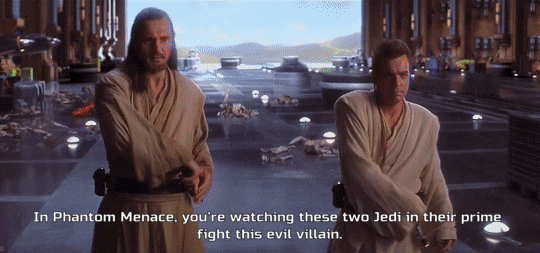
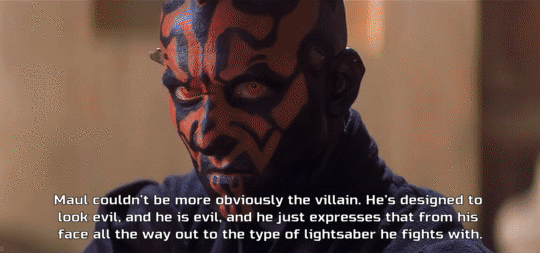


OKAY, IF I’M GONNA DO THIS, I’M GONNA DO IT PROPERLY. WHICH MEANS YEAH IT’S GONNA GET REALLY LONG.
A couple of things to say ahead of time: Lucasfilm’s Story Group has always said CANON > WORD OF GOD when it comes to these matters, so when I quote canon examples from supplementary materials that contradict what he says, that’s LF’s official position, but that doesn’t mean that an influential person like Dave’s views couldn’t affect how things will be shaped in the future, like Deborah Chow listening to this may be influenced by it on the Obi-Wan show, despite that Master & Apprentice contradicts him. It’s an incredibly murky area! Mileages are going to vary.
Another thing to keep in mind is that Dave Filoni never worked on The Phantom Menace, that was long, long before his time at Lucasfilm (which I think he joined sometime around 2007? and TPM was released in 1999), that he has worked with George more than probably anyone else, but we cannot and should not treat him as infallible or the True Authority on things, because even Dave himself has said things like:
“I mean, I know why I did that and what it means, but I don't like to explain too much. I love for the viewers to watch stuff and come up with their own theories -- and they frankly come up with better things that I intended.” --Dave Filoni, Entertainment Tonight 2020 interview
Or, in the same episode as the above Qui-Gon interpretation:
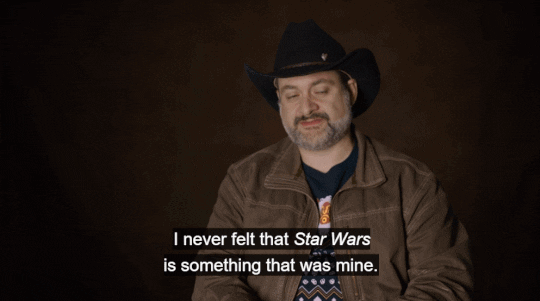


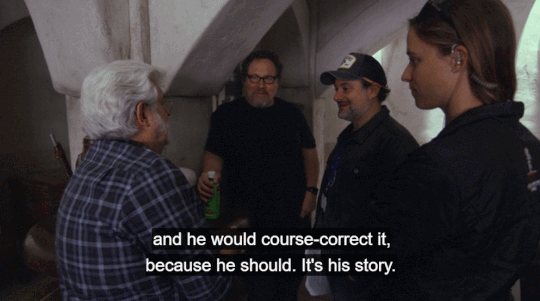
So, when I dig into this, I’m not doing this out of a sense of malice or even that I suddenly hate Dave or don’t appreciate all the incredible things he’s brought to SW, but in that I disagree with his take, Dave understands that he doesn’t always get it right, that he enjoys that fans come up with different things than he does and sometimes he likes those even more. There’s room for both of us and, for all that Dave mentions George a lot (and, hey, fair enough, the guy worked with George and I’m just quoting what George Lucas has said) doesn’t mean that this is straight from George, especially because I have never seen George Lucas utter so much as a peep about how the Jedi were responsible for Anakin’s fall. He has explicitly and frequently talked about how Anakin’s fall was his own choice, as well as I’ve never seen him say anything Jedi-critical beyond “they were kind of arrogant about themselves”. I have read and watched every George Lucas interview I could get my hands on and maybe I’m still missing something, but that’s literally the extent of him criticizing the Jedi I have EVER seen.
(It’s from the commentary on AOTC where he put in the scene with Jocasta to show they were full of themselves, but I also think it’s fair to point out that Obi-Wan immediately contradicts this by going to Dex for help, showing that it’s not necessarily a Jedi-wide thing.)
Before I go further, I want to say: this is not a post meant to tear down Qui-Gon, he is a character I actually really do love, but the focus is on showing why the above interpretation of him is wrong, which means focusing on Qui-Gon’s flaws. He has many wonderful qualities, he is someone who cared deeply and was a good person, I think things would have been better had he lived! But Anakin’s choices did not hinge on him, because Anakin’s choices were Anakin’s, that has always been the consistent theme of how George talks about him, the way he talks about the story is always in terms of “Anakin did this” or “Anakin chose that”, and the Jedi are very consistently shown as caring, they believed very much in love and Dave’s own show (well, I say “his own show”, but honestly TCW was George’s baby primarily and he had a lot of direct, hands-on say in crafting it, through at least the first five seasons) is plenty of evidence of that.
I’m not going to quote the full thing because this is already a monster post, I’m just going to focus on the Jedi stuff, because I like the other points a lot, but if you want the full text, it’s here. The relevant part is:
“In Phantom Menace, you’re watching these two Jedi in their prime fight this evil villain. Maul couldn’t be more obviously the villain. He’s designed to look evil, and he is evil, and he just expresses that from his face all the way out to the type of lightsaber he fights with. What’s at stake is really how Anakin is going to turn out. Because Qui-Gon is different than the rest of the Jedi and you get that in the movie; and Qui-Gon is fighting because he knows he’s the father that Anakin needs. Because Qui-Gon hasn’t given up on the fact that the Jedi are supposed to actually care and love and that’s not a bad thing. The rest of the Jedi are so detached and they become so political that they’ve really lost their way and Yoda starts to see that in the second film. But Qui-Gon is ahead of them all and that’s why he’s not part of the council. So he’s fighting for Anakin and that’s why it’s the ‘Duel of the Fates’ – it’s the fate of this child. And depending on how this fight goes, Anakin, his life is going to be dramatically different.
“So Qui-Gon loses, of course. So the father figure, he knew what it meant to take this kid away from his mother when he had an attachment, and he’s left with Obi-Wan. Obi-Wan trains Anakin at first out of a promise he makes to Qui-Gon, not because he cares about him. When they get Anakin, they find him on Tatooine, he says “Why do I feel like we’ve found another useless lifeform?” He’s comparing Anakin to Jar Jar and he’s saying “this is a waste of our time, why are we doing this, why do you see importance in these creatures like Jar Jar Binks and this ten-year-old boy? This is useless.”
“So, he’s a brother to Anakin eventually but he’s not a father figure. That’s a failing for Anakin. He doesn’t have the family that he needs. He loses his mother in the next film. He fails on this promise that he made, “mother, I’m going to come back and save you”. So he’s left completely vulnerable and Star Wars is ultimately about family. So that moment in that movie which a lot of people I think diminish, “oh there’s a cool lightsaber fight”, but it’s everything that the entire three films of the prequels hangs on, is that one particular fight. And Maul serves his purpose and at that point died before George made me bring him back, but he died.“ --Dave Filoni
I’m going to take this a piece at a time to show why I really disagree with the content of both the movies and The Clone Wars supporting what Dave says and, instead, contradicts it a lot.
The rest of the Jedi are so detached and they become so political that they’ve really lost their way and Yoda starts to see that in the second film.
He doesn’t explain what this means, but I’m pretty sure that he’s referring to this conversation:
OBI-WAN: “I am concerned for my Padawan. He is not ready to be given this assignment on his own yet.”
YODA: “The Council is confident in its decision, Obi-Wan.”
MACE WINDU: “The boy has exceptional skills.”
OBI-WAN: “But he still has much to learn, Master. His abilities have made him... well.... arrogant.”
YODA: “Yes, yes. A flaw more and more common among Jedi. Hmm... too sure of themselves they are. Even the older, more experienced ones.”
MACE WINDU: “Remember, Obi-Wan, if the prophecy is true, your apprentice is the only one who can bring the Force back into balance.”
OBI-WAN: "If he follows the right path.”
None of that has anything to do with being “detached” and, further, I think this is something that’s come up with Dave’s view of Luminara a lot, because he’s described her (re: the Geonosis arc): “We were trying to illustrate the difference between the way Anakin is raising his Padawan, and how much he cares about her, and the way Luminara raises her Padawan. Not that Luminara is indifferent, but that Luminara is detached. It’s not that she doesn’t care, but she’s not attached to her emotionally.”
Here, he says that the Jedi care, in the above, he says that the Jedi don’t care, which makes me think there’s a lot of characterization drift as time goes on, especially when fandom bombards everyone with the idea that the Jedi were cold, emotionless, and didn’t care. However, look at Luminara’s face in that arc, when she’s talking with Anakin:
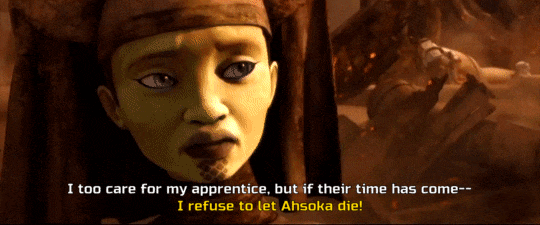
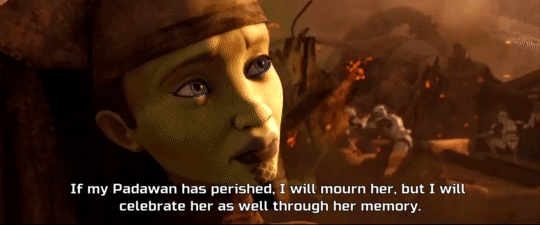
That is not the face of someone who doesn’t care. She even smiles brightly in relief when Barriss is shown to be okay, that this really doesn’t convey “detached” in an unloving or uncaring way. (We’ll get to attachment later, that’s definitely coming.)
(I’m also mostly skipping the political thing, because I think that’s just a fundamental disagreement of whether Jedi should or should not lean into politics. My view basically boils down to that I think ALL OF US should be leaning more into politics because we are citizens who live in the world and are responsible for it, and the Jedi are no different. This is evidenced by:
- M&A’s storyline has Qui-Gon and Obi-Wan saving the day specifically because they play politics, that’s how they manage to free the slaves, through playing politics and being part of the Republic/having Senate backing.
- The Clone Wars has shown that the Jedi believe “lasting change can only come from within” and “it’s every citizen’s duty to hold their leaders accountable” when Ahsoka teaches the cadets on Mandalore, as well as that politics are not inherently bad, given that Padme and Bail are working to make the system better or “create lasting change from within [the system]”
- "Trying to serve the greater good does not always make you popular” says Padme Amidala in a very caring speech
- Star Wars Propaganda makes the case that the Jedi might have won the war had they leaned more into politics.
- Sometimes the Jedi get unfairly accused of playing politics when there’s just no good choice and they still have to choose one or the other.)
But Qui-Gon is ahead of them [re: caring and loving] all and that’s why he’s not part of the council.
This is flat-out wrong in regards to canon. Mileages are going to vary, of course, on how much one takes a novel into consideration, but Dave Filoni is not a fan with the luxury of deciding what is or isn’t canon, he works on Star Wars where canon is canon. Now, does that mean canon will never contradict itself, especially if Dave gets to write something for Qui-Gon? Of course not, SW isn’t immune to continuity errors and they themselves have never said otherwise, even when fans want to hold them to that standard.
However, this is still pretty much a big “that’s not what happened” instance. In Master & Apprentice, the Jedi Council offer a seat to Qui-Gon on the Council, specifically BECAUSE he has different opinions from them and they welcome that. (Excerpt here.)
“We hope it will also be our gain,” Mace replied. “Qui-Gon Jinn, we hereby offer you a seat on the Jedi Council.”
Had he misheard? No, he hadn’t. Qui-Gon slowly gazed around the circle, taking in the expressions of each Council member in turn. Some of them looked amused, others pleased. A few of them, Yoda included, appeared more rueful than not. But they were serious.
“I admit—you’ve surprised me,” Qui-Gon finally said.“I imagine so,” Mace said drily. “A few years ago, we would’ve been astonished to learn we would ever consider this. But in the time since, we’ve all changed. We’ve grown. Which means the possibilities have changed as well.”
Qui-Gon took a moment to collect himself. Without any warning, one of the turning points of his life had arrived. Everything he said and did in the next days would be of great consequence. “You’ve argued with my methods often as not, or perhaps you’d say I’ve argued with yours.”
“Truth, this is,” Yoda said.
Depa Billaba gave Yoda a look Qui-Gon couldn’t interpret. “It’s also true that the Jedi Council needs more perspectives.”
Ultimately, Qui-Gon is the who turns them down and gives up a chance to shape the Jedi Council because he doesn’t like the shape they’re taking. That he does become less political, but this is after he’s argued that the Jedi should be working to push the Senate harder, so when he has a chance to help with that, he turns it down. It has nothing to do with caring and loving, it’s about Qui-Gon’s desire to not have to deal with the work himself, when he wants to be more of a hippie Jedi. (I’ve written a lot about Qui-Gon in M&A, why I actually think it’s really spot-on to someone who can be both really kind and really kind of a dick, but it’s not the most flattering portrayal, even if narrative intention likely didn’t mean what came across to me. I think this post and this post are probably the most salient ones, but if you want something of an index of the web that’s being woven with all the various media, this one is good, too.)
So he’s fighting for Anakin and that’s why it’s the ‘Duel of the Fates’ – it’s the fate of this child. And depending on how this fight goes, Anakin, his life is going to be dramatically different.
I have only ever seen George Lucas talk about Anakin’s fate in one instance and it’s this: “It’s fear of losing somebody he loves, which is the flipside of greed. Greed, in terms of the Emperor, it’s the greed for power, absolute power, over everything. With Anakin, really it’s the power to save the one he loves, but it’s basically going against the Fates and what is natural.“ –George Lucas, Revenge of the Sith commentary
I’ve made my case about why I think Anakin’s fate is about that moment in Palpatine’s office, and so I’m not fundamentally opposed that “Duel of the Fates” is about Anakin’s fate, but here’s what George has provably said about the “Duel of the Fates” part of the story:
- In the commentary for The Phantom Menace during “Duel of the Fates” and none of Dave’s speculation is even hinted at, there’s more focus on the technical side of things and the most George talks about is that it’s Obi-Wan who parallels Luke in going over the edge during the fight, except that instead of a Sith cutting off a Jedi’s hand, it’s a Jedi cutting a Sith in half, drawing the parallels between them.
- He does say of the funeral scene that this is where Obi-Wan commits to training Anakin and how everything is going to go (though, in canon we see that Obi-Wan still struggles with this a bit, but Yoda is there to support him and nudge him into committing even more to Anakin, because the Jedi are a supportive community to each other). This is some solid evidence for that Obi-Wan is already caring about Anakin beyond just Qui-Gon.
- Then here’s what he says about the “Duel of the Fates” fights and themes of them in "All Films Are Personal":
George Lucas: “I wanted to come up with an apprentice for the Emperor who was striking and tough. We hadn’t seen a Sith Lord before, except for Vader, of course. I wanted to convey the idea that Jedi are all very powerful, but they’re also vulnerable — which is why I wanted to kill Qui-Gon. That is to say, “Hey, these guys aren’t Superman.” These guys are people who are vulnerable, just like every other person.
“We needed to establish that, but at the same time, we wanted the ultimate sword fight, because they were all very good. It sort of predisposes the sword fight between Anakin and Obi-Wan later on. There’s real purpose to it. You have to establish the rules and then stick with them. The scene illustrates just how Jedi and Sith fight and use lightsabers.”
“So Qui-Gon loses, of course. So the father figure, he knew what it meant to take this kid away from his mother when he had an attachment, and he’s left with Obi-Wan. Obi-Wan trains Anakin at first out of a promise he makes to Qui-Gon, not because he cares about him.
We’ll get to the “attachment to his mother” thing in a bit--but, for now, let’s just say, George Lucas’ words on this are not that attachment to her was a good thing.
Fair enough that “not because he cares about him” is up to personal interpretation, but canon has also addressed the topic of Obi-Wan’s treatment of Anakin and Obi-Wan stepped up to the plate on this. In addition to how we see Obi-Wan REPEATEDLY being there for Anakin and being concerned and caring about him, they specifically talk about Qui-Gon and overcome this hurdle.
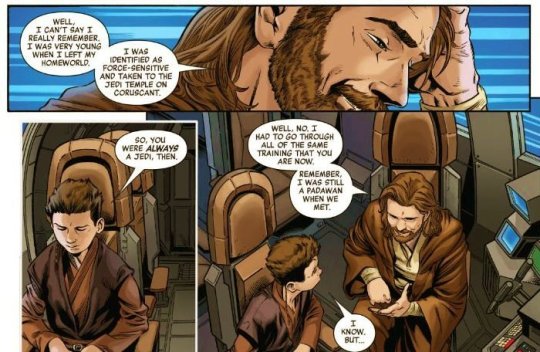
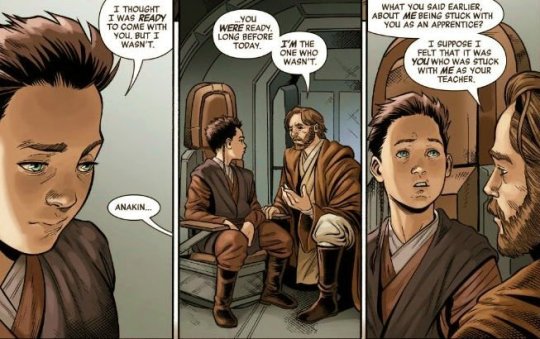
No, Obi-Wan is not Anakin’s father figure, on that we definitely agree. Anakin never really even treats Obi-Wan like a father--he says “you’re the closest thing I have to a father” in Attack of the Clones, as well as he says Obi-Wan practically raised him in The Clone Wars “Crystal Crisis” story reels, but Anakin has never actually acted like Obi-Wan is his father--”then why don’t you listen to me?” Obi-Wan points out in AOTC--as well as Obi-Wan glides past those remarks, which I’ve always taken that he doesn’t want to reject Anakin’s feelings, knowing that Anakin can be sensitive about them, but neither does he want to confirm them.
This does not mean Obi-Wan was not supportive, caring, and loving. He says, “I loved you!” to Anakin in Revenge of the Sith, he asks after him and if he’s sleeping well in Attack of the Clones, and even George Lucas himself said that the elevator scene was set up TO SHOW OBI-WAN AND ANAKIN CARE FOR EACH OTHER:
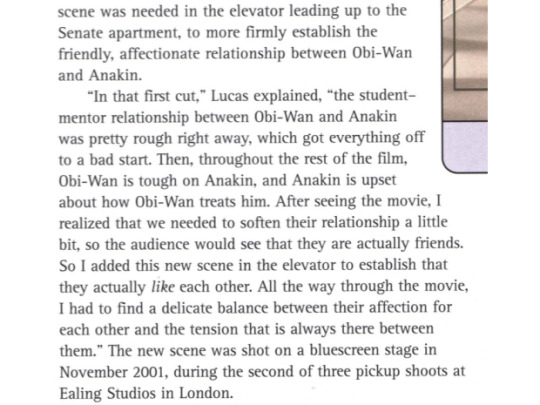
PUTTING THE REST UNDER A READ MORE FOR A BETTER LENGTH REBLOGGABLE VERSION, IF YOU WANT.
This is further evidenced by how the Jedi do see themselves as family, they just don’t need to put it into strict nuclear family dynamics:
- “You were my brother, Anakin! I loved you!” [–Obi-Wan Kenobi, Revenge of the Sith]
- “We are brothers, Master Dibs.” [–Mace Windu, Jedi of the Republic - Mace Windu]
- “Did your parents bicker?” she asked. “The adoptive ones, I mean.”
A slow smile broke across Ashla’s face, curling first one side of her mouth and then the other. Whatever she was remembering, Kaeden could tell it was good.
"All the time,“ Ashla said, almost as if she were talking to herself. [–Kaeden Larte, Ahsoka Tano, Ahsoka]
- Vos, brought to the Temple even younger than most, felt that he had hundreds of brothers and sisters, and it seemed that whenever he went into the dining hall he ran into at least half of them. [Dark Disciple]
- “It was not his birthplace, exactly, but the Jedi Temple was where Quinlan Vos had grown up. He’d raced through its corridors, hidden behind its massive pillars, found peace in its meditation hall, ended-and started-fights in rooms intended for striking blows and some that weren’t, and sneaked naps in its library. All Jedi came here, at some point in their lives; for Quinlan, it always felt like coming home when he ran lightly up the stairs and entered the massive building as he did now.” [Dark Disciple]
Brothers, sisters, and other more non-traditional kinds of family are not lesser and Obi-Wan and Anakin absolutely were family, just as the Jedi are all family to each other, so, no, there was no “failing” Anakin, except in Anakin’s mind, perhaps. (In that, I can agree. But not on a narratively approved level, canon too thoroughly refutes that for me.)
Rebels as well pretty thoroughly shows that non-traditional families are meaningful and just as important--we may joke that Hera is “space mom”, but she’s not actually Ezra or Sabine’s mother, Kanan is not actually their father, and even if they sometimes stray into aspects of those roles (as the Jedi do as well in the movies and TCW), that they don’t need that traditional nuclear family structure. Mentor figures--and Kanan is Ezra’s mentor--are just as meaningful and needful as a “dad”. And I’m kind of :/ at the implication that anyone without a dad/father figure or mom/mother figure is being “failed”.
When they get Anakin, they find him on Tatooine, he says “Why do I feel like we’ve found another useless lifeform?” He’s comparing Anakin to Jar Jar and he’s saying “this is a waste of our time, why are we doing this, why do you see importance in these creatures like Jar Jar Binks and this ten-year-old boy? This is useless.”
Whether or not Obi-Wan is being genuinely dismissive in this movie (I think you could make a case either way), the idea that Qui-Gon is better than Obi-Wan about this, as shown through Jar Jar isn’t exactly very supported given how Qui-Gon and Jar Jar first exchange words:

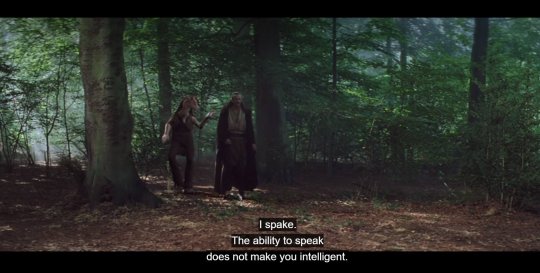
QUI-GON: “You almost got us killed. Are you brainless?”
JAR JAR: “I spake.”
QUI-GON: “The ability to speak does not make you intelligent.”
Qui-Gon is just as bad as everyone else to Jar Jar, he’s not somehow elevated above them.
It’s also baffling because, Dave, I have watched your show. The Jedi are specifically shown to be kind to people and creatures, not considering them “useless”. Henry Gilroy (who was the co-writer for The Clone Wars and frequently appeared in featurettes on the same level as Dave Filoni) explicitly draws this to The Jedi Way, that “life is everything to the Jedi“, when he said this about the Ryloth episodes:
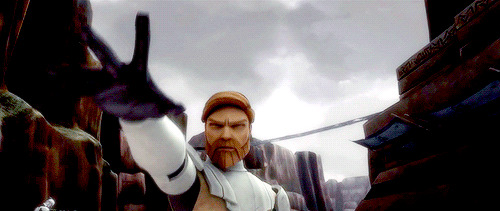
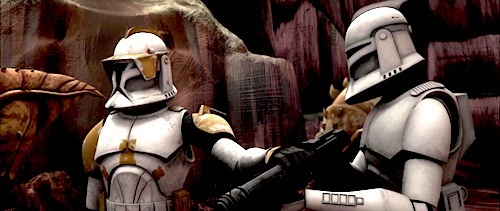
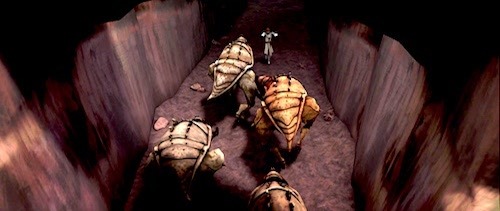
(Caps cribbed from Pan’s blog, because I cannot make another gif, save me, please.)
Henry Gilroy in an Aggressive Negotiations Interview: "Obi-Wan truly is a Jedi in that he’s like, ‘Okay, I’m not going to murder these creatures [in the Ryloth arc of The Clone Wars]. They’re starving to death. They’ve basically been unleashed against these people as a weapon, but it’s not their fault. They’re just doing what they do. They’re just animals who wanna eat.’
"So the idea was–and I think there was an early talk about how, 'Oh, yeah, he’ll go running through them and slicing and dicing them and chop them all up or whatever, and save his guys. And I’m like, 'Yeah, but that’s not really the Jedi way. He’s not just gonna murder these creatures.’
"And I know the threat is [there], to save one life you have to take one, but the idea of him [is]: why can’t Obi-Wan just be more clever? He basically draws them in and then traps them.
"It says something about who the Jedi are, they don’t just waste life arbitrarily. And someone could have gone, 'Oh, yeah, but it would have been badass if he’d just ran in there with his lightsaber spinning and stabbed them all in the head!’ And 'Yeah, you’re right, I guess he could be that, but he’s trying to teach his clones a lesson right then, about the sanctity of life.’
"That is the underlying theme of that entire episode. Which is: A tactical droid is using the people as living shields. Life means nothing to the Separatists. The droids. But life is everything to the Jedi. And even though he doesn’t have to say that, it’s all through the episode thematically.“
It’s also Obi-Wan who teaches Anakin about kindness to mindless creatures in the Obi-Wan & Anakin comic:

"These beasts are nearly mindless, Anakin. I can feel it. They are merely following their nature, they should not die simply because they crossed our path. Use the Force to send them on their way.”
Now, fair enough if you want to say Obi-Wan was taught by Qui-Gon, but also Qui-Gon is dead by that point and Obi-Wan growing into being more mature is his own accomplishment, not Qui-Gon’s, especially given that we see Qui-Gon himself being pretty dismissive to Jar Jar in TPM.
This isn’t unique thing either, Padme is incredibly condescending to Jar Jar in “Bombad Jedi” and expresses clear annoyance with him to C-3PO when sighing over him. Jar Jar is a character you kind of have to warm up to, pretty much the only one we’ve seen consistently being favorable to him is Yoda (and maybe Anakin, though, Anakin doesn’t really interact with him a ton) and Mace Windu warms up to him considerably in “The Disappeared” and even specifically is shown to be teaching him and helping him, which is a huge theme of the Jedi and how much they care.
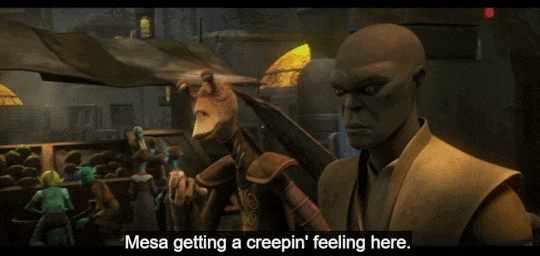
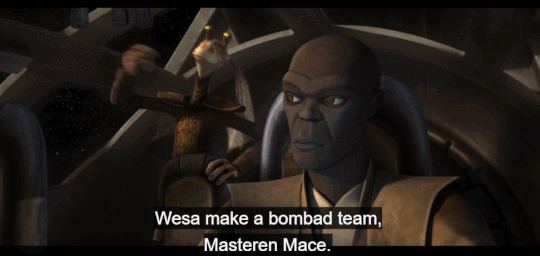
So, ultimately, the point I’m winding my way towards is--the other Jedi do show kindness and consideration to Jar Jar Binks, including characters like Mace Windu, so if you’re judging the Jedi based on that, the conclusion of Qui-Gon somehow being more compassionate and loving is really pretty thoroughly disproved by The Phantom Menace and The Clone Wars themselves.
So, he’s a brother to Anakin eventually but he’s not a father figure. That’s a failing for Anakin. He doesn’t have the family that he needs. He loses his mother in the next film. He fails on this promise that he made, “mother, I’m going to come back and save you”. So he’s left completely vulnerable and Star Wars is ultimately about family.
You could be charitable and say this is just from Anakin’s point of view that it’s a “failing”, but within the context of what Dave’s saying, it’s clearly meant as a more narratively approved take, not just Anakin’s point of view, and I really, really dislike the idea that Anakin--or anyone, really--needs a traditional nuclear family, ie a “mom” and/or a “dad”, or else it’s a “failing” for them.
Setting aside that the idea that Qui-Gon would need to be Anakin’s dad to be kind to hi (which is ?????) is contradicted by The Clone Wars as well. Yes, Qui-Gon is warm with Anakin in several scenes, which is what Dave is presumably drawing on to show that Qui-Gon believed the Jedi should be caring and loving, but you know who else is warm to younglings? OTHER JEDI COUNCIL MEMBERS.
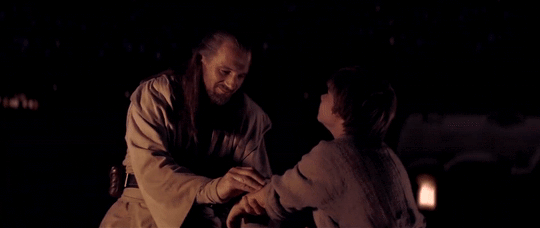
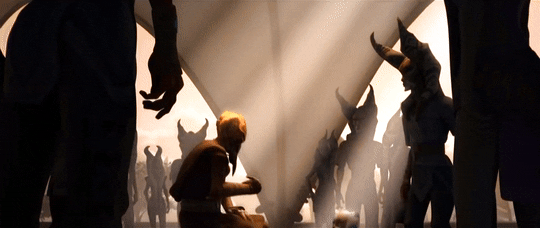
Those two scenes have the exact same kind of warmth to them. Ie, THE JEDI ALL BELIEVED IN BEING LOVING AND KIND, NOT JUST QUI-GON. The things evidenced to show Qui-Gon was loving and kind are evidenced just as much in other Council members, in Dave’s own show.
As a bonus--have Mace Windu, known Jedi Council member, being super kind and loving towards a young Twi’lek girl he just met in a canon comic:
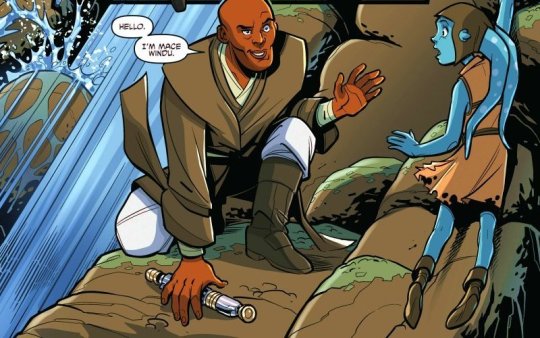
But I know that this is about the way the Council treated Anakin in The Phantom Menace testing scene, but here’s the thing--when I go back and I watch that scene and the Jedi aren’t ever mean to him, they’re neutral in an official testing situation, where they are trying to determine if he’s able to adapt to the Jedi ways. They never once say he’s bad for holding onto his fear, only that he does--which Anakin digs his heels in and gets angry about, he can’t really even admit that he’s afraid and that’s a huge deal for the Jedi.
I’ve made a longer post about it here (and here), but the basic gist is:
- That scene has Yoda giving the famous “Fear leads to the dark side” speech which is almost word for word how George Lucas describes how the Force works, showing the Jedi are narratively correct
- “Confronting fear is the destiny of a Jedi” may be from the sequels, but it is thoroughly supported by the movies and TCW and Rebels and even supplementary canon material, including that the Jedi literally design their tests around both Masters and Padawans for it (Ilum, the Jedi Temple on Lothal, etc.
- Anakin cannot admit to his fears in that TPM scene
- We have examples of Jedi younglings do admit to their fears and the point isn’t not to have them, but to face them--the younglings in “The Gathering” are the most blatant example of this, but it’s also pretty much the entire theme of Jedi: Fallen Order, especially when Cal goes to Ilum to face his fears and get another kyber crystal.
The point isn’t that Anakin--who has very good reasons to be afraid! nothing in the story or the Jedi have said he didn’t!--is wrong or bad, but that he’s not a great fit for the Jedi life because he is “unwilling to accept [Jedi philosophy] emotionally”. And they’re right about this, because this is how George Lucas describes Anakin in commentary:
“The fact that everything must change and that things come and go through his life and that he can’t hold onto things, which is a basic Jedi philosophy that he isn’t willing to accept emotionally and the reason that is because he was raised by his mother rather than the Jedi. If he’d have been taken in his first year and started to study to be a Jedi, he wouldn’t have this particular connection as strong as it is and he’d have been trained to love people but not to become attached to them.” --George Lucas, Attack of the Clones commentary
And so this brings us to A T T A C H M E N T, which, yeah, we’ve been having this discussion forever, but I’m going to state it again: Within Star Wars, ATTACHMENT IS NARRATIVELY A BAD THING. It is consistently tied to possessive, obsessive relationships, to greed and an unwillingness to let things go when it’s time (letting go is a huge theme in Star Wars) and equating love with attachment is fundamentally wrong according to George Lucas’ Star Wars worldbuilding:
“The Jedi are trained to let go. They’re trained from birth,” he continues, “They’re not supposed to form attachments. They can love people-- in fact, they should love everybody. They should love their enemies; they should love the Sith. But they can’t form attachments. So what all these movies are about is: greed. Greed is a source of pain and suffering for everybody. And the ultimate state of greed is the desire to cheat death.” --George Lucas, The Making of Revenge of the Sith
If attachment and love were the same thing, then he would be saying, “They should love their enemies, they should love the Sith. But they can’t love.” The way George makes the distinction shows that, no, attachment and love aren’t the same thing at all, attachment is not caring. Further, there’s another instance of him showing there’s an important distinction between relationships and attachment and the association of attachmets with possession: "Jedi Knights aren’t celibate - the thing that is forbidden is attachments - and possessive relationships.” --George Lucas, BBC News interview
So, yes, when Anakin is attached to people, it is directly tied to obsession, possession, and greed, all things of the dark side:
“He turns into Darth Vader because he gets attached to things. He can’t let go of his mother; he can’t let go of his girlfriend. He can’t let go of things. It makes you greedy. And when you’re greedy, you are on the path to the dark side, because you fear you’re going to lose things, that you’re not going to have the power you need.” --George Lucas, Time Magazine
“But he has become attached to his mother and he will become attached to Padme and these things are, for a Jedi, who needs to have a clear mind and not be influenced by threats to their attachments, a dangerous situation. And it feeds into fear of losing things, which feeds into greed, wanting to keep things, wanting to keep his possessions and things that he should be letting go of. His fear of losing her turns to anger at losing her, which ultimately turns to revenge in wiping out the village. The scene with the Tusken Raiders is the first scene that ultimately takes him on the road to the dark side. I mean he’s been prepping for this, but that’s the one where he’s sort of doing something that is completely inappropriate.“ --George Lucas, Attack of the Clones commentary
ATTACHMENT IS BAD IN STAR WARS AS THEY DEFINE IT.
Finally, I’m going to circle back to:
Because Qui-Gon is different than the rest of the Jedi and you get that in the movie; and Qui-Gon is fighting because he knows he’s the father that Anakin needs. Because Qui-Gon hasn’t given up on the fact that the Jedi are supposed to actually care and love and that’s not a bad thing.
Here’s the thing about this: You know who else, by this logic, Qui-Gon should have been a father to? OBI-WAN KENOBI.
This isn’t said as “Anakin specifically needs a father” (which I think would be an interesting idea to bandy about and I’m not disagreeing, though, it’s complicated because of what Anakin refuses to accept emotionally), it’s said in a bigger context, that Qui-Gon is better than the other Jedi because he understands the need for fathers (and thus this ties into Return of the Jedi) and he’s ahead of the other Jedi, who apparently think loving and caring about people are bad things, but Qui-Gon does not treat Obi-Wan like his son. Or, if he does, he’s not exactly a stellar dad about it.
Within Master & Apprentice, there’s an incredibly consistent theme of how Qui-Gon thinks supportive things about Obi-Wan, but never says them aloud. He thinks he should talk to Obi-Wan about the upcoming decision to be on the Council and then never does. He could have explained why he kept Obi-Wan training the basics but he never does. There are multiple instances showing that Qui-Gon is actually really, really bad at actually handling a young apprentice who needs him to talk to them about important things. Qui-Gon continues this in From a Certain Point of View where he still never talked to Obi-Wan about everything that happened, even after he became a Force Ghost.
Damn, damn, damn. Qui-Gon closed his eyes for one moment. It blocked nothing; the wave of shock that went through Obi-Wan was so great it could be felt through the Force. Qui-Gon hadn’t thought Kirames Kaj would mention the Jedi Council invitation. It seemed possible the soon-retiring chancellor of the Republic might not even have taken much note of information about a new Council member. --Master & Apprentice
That comment finally pierced Qui-Gon’s damnable calm. There was an edge to his voice as he said, “I suspected you would be too upset to discuss this rationally. Apparently I was correct.”
“I thought you said my reaction was understandable,” Obi-Wan shot back. “So why does it disqualify me from hearing the truth?”
Qui-Gon put his hands on his broad belt, the way he did when he was beginning to withdraw into himself. “…we should discuss this at another time. Neither of us is his best self at the present.” --Master & Apprentice
Obi-Wan walked toward the door, obviously outdone. “At the beginning of my apprenticeship, I couldn’t understand you,” he said. “Unfortunately, that’s just as true here at the end.”
Only yesterday they had worked together as never before. How did Qui-Gon manage to get closer to Obi-Wan at the same time he was moving further away?
Just before Obi-Wan would leave the room, Qui-Gon said, “Once, you asked me about the basic lightsaber cadences. Why I’d kept you there, instead of training you in more advanced forms of combat.”
Obi-Wan turned reluctantly to face him again. “I suppose you thought I wasn’t ready for more. The same way I’m not ready to believe in all this mystical—”
“That’s not why.”
After a long pause, Obi-Wan calmed to the point where he would listen. “Then why, Qui-Gon?”
“Because many Padawans—and full Jedi Knights, for that matter—forget that the most basic technique is the most important technique. The purest. The most likely to protect you in battle, and the foundation of all knowledge that is to come,” Qui-Gon said. “Most apprentices want to rush ahead to styles of fighting that are flashier or more esoteric. Most Masters let them, because we must all find our preferred form eventually. But I wanted you to be grounded in your technique. I wanted you to understand the basic cadences so well that they would become instinct, so that you would be almost untouchable. Above all, I wanted to give you the training you needed to accomplish anything you set your mind to later on.”
Obi-Wan remained quiet for so long that Qui-Gon wondered if he were too angry to really hear any of what he’d said. But finally, his Padawan nodded. “Thank you, Qui-Gon. I appreciate that. But—”
“But what?”
“You could’ve said so,” Obi-Wan replied, and then he left. --Master & Apprentice
"I owe you that. After all, I’m the one who failed you.“
"Failed me?”
They have never spoken of this, not once in all Qui-Gon’s journeys into the mortal realm to commune with him. This is primarily because Qui-Gon thought his mistakes so wretched, so obvious, that Obi-Wan had wanted to spare him any discussion of it. Yet here, too, he has failed to do his Padawan justice. --From a Certain Point of View, “Master and Apprentice”
(Further, in Master & Apprentice, Qui-Gon thinks that the Jedi give Rael Averross--who is HUGELY paralleled to Anakin--too many exceptions, were too soft on him because he came to the Jedi later than most and has trouble thinking of them as his family, and he thinks they should have been stricter with him.)
It’s also readily apparent within The Phantom Menace itself:
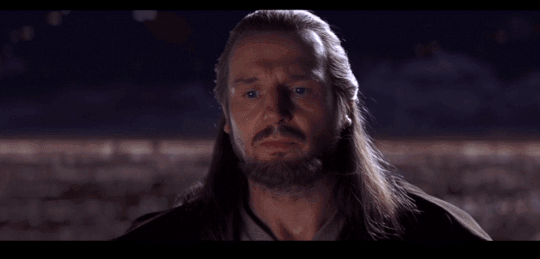
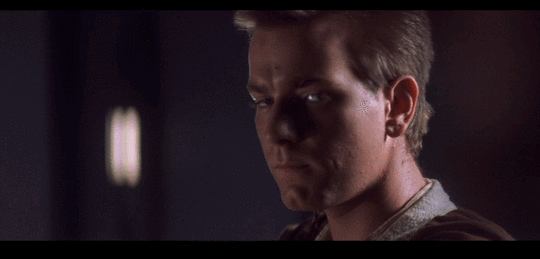
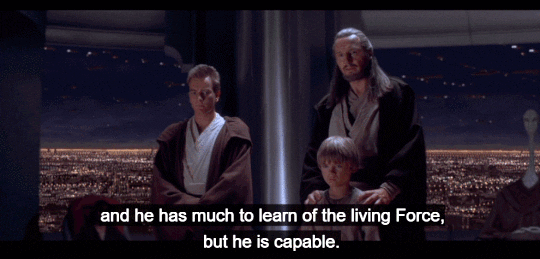

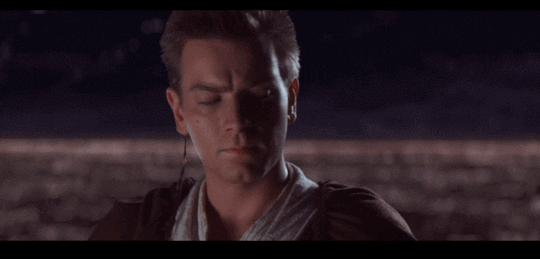
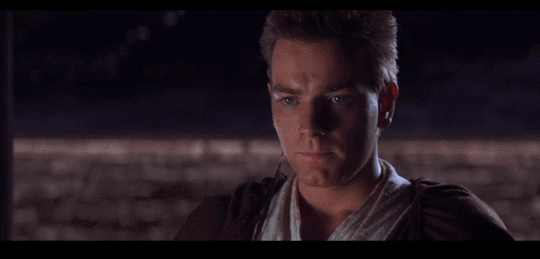
You can take some charitable views of this scene, that Qui-Gon was pushed into a corner where he had few other options (and this is the view I generally take even!), but this is after the entire movie where he’s never once indicated that Obi-Wan was ready, has instead indicated that he still has much to learn (not just of the Living Force, but in general), as well as made it clear that he’s still teaching Obi-Wan, like on the Trade Federation ship.
And I do think Obi-Wan got over this because he understood, because Obi-Wan actually is a very selfless person, he clearly cares (which is furthered by how we see him warm up to Anakin very quickly), but look at their faces.
This was not a good moment, and they do somewhat make up, where Qui-Gon says that Obi-Wan has been a good apprentice, that he’s wiser than Qui-Gon and he’ll be a great Jedi--but if we’re counting that as Qui-Gon being this great Jedi, then you can’t say Obi-Wan failed Anakin, given that we show him doing the exact same thing, except better. He tells Anakin, “You are strong and wise and will become a far greater Jedi than I could ever hope to be.”, echoing Qui-Gon’s words, but also he never threw Anakin aside for someone else.
This is kind of a major undercurrent throughout The Clone Wars, where Obi-Wan never takes another apprentice, where he continues to teach Anakin, to support him, even to the point of occasionally co-Mastering Ahsoka with him. “This has been quite a journey for our Padawan.”
Qui-Gon’s treatment of Obi-Wan in this scene isn’t the worst, he’s kind about it later (though, he never actually specifically apologizes for this), but we can see that this is a moment where Qui-Gon hurts Obi-Wan and knows it.
And you know what George Lucas has to say about Qui-Gon? This:
“So here we’re having Qui-Gon wanting to skip the early training and jump right to taking him on as his Padawan learner, which is controversial, and ultimately, the source of much of the problems that develop later on.” –George Lucas, The Phantom Menace commentary
There’s nothing about Qui-Gon being right or better than the other Jedi, but instead that Qui-Gon’s actions here are a source of much of the problems that develop later on.
So, ultimately, I liked some points Dave made in that speech, it’s a beautiful and eloquent one, but I thoroughly disagree with his interpretation of George’s intentions for Qui-Gon and I thoroughly disagree that that’s what the movies, The Clone Wars (DAVE’S OWN SHOW), and the supplementary canon show about Qui-Gon and the other Jedi. I still stand by my appreciation of Dave’s contributions to SW as a whole, I think he does a really good job at making Star Wars, but he doesn’t always get everything right and this is one thing where I think the canon and George’s commentary show otherwise, as much as I love his desire to defend the prequels’ importance in the story. Because, my friend, I have felt that every single day of my SW life.
981 notes
·
View notes
Text
Howl's Moving Castle & the Power Narrative Holds Over Reality
Like most 90s borns, my first anime was Pokémon. I watched the first three seasons diligently, and my tooth fairy gifts were always VHSs of memorable episodes. But like most Millennials and even Gen-X before us, my first real entryway to Japanese culture was Hayao Miyazaki. On the tiny TV screen, behind even for 2002, where my mother would watch her TV shows as she worked out, I watched Spirited Away. Chihiro/Sen's coming-of-age story and the movie's numerous themes deserves their own essay, and one I think better bloggers, vloggers and ordinary people have written before me. But after such a masterpiece, I jumped at the chance to see the next Studio Ghibli movie, Howl's Moving Castle. I rushed to the local library to read the book before it aired in the nearby city's bus station mall's small cinema. 18 years later, too nauseous for schoolwork and mooching off of my dad's Netflix account, I decided to rewatch this film.
***Spoiler alert for both book AND film***
The film itself is a staunch anti-war message, released around the same time as the invasion of Iraq, informed by Miyazaki's own childhood in the final years of Imperial Japan and the horrors inflicted on his home country to set the stage of the Cold War. The exposition includes a bombing of Sophie's hometown with...banners. The citizens of Ingary are terrified of the flying machines descending upon their skies, they expect bombs and destruction and untold death and unspeakable horrors. So when they instead get rained down paper pieces with pictures and words we are never privy to, they treat it with suspicion. They refuse to so much as touch them, since it's of the enemy. And the day after, when Ingary soldiers distribute their own country's propaganda banners, they drink it down without a second thought. Again, we are never privy to what they say. Perhaps it was meaningless. Perhaps, to the common contemporary viewer, the content would be incomprehensible. But for me, it got me thinking: What if this was the "enemy" spreading missing posters of their prince? What if this was a warning for the townspeople to evacuate, as they expect to take point there? And if it was, what the hell did it accomplish, outside of everything BUT what it tried to? The people are too scared. They see it as psychological warfare, whether intentional or not, and therefore the papers become a terrorizing presence, whether they were filled with graphic threats or pleas for cooperation, all it ended up doing is scaring the population into a deeper layer of hatred. I personally disagree with the film's apparent message, but I agree with how much of war is the matter of spinning the truth.
No character represents a better allegory for spinning the truth than Sophie Hatter, the main character of the movie. The first thing we notice about her is how intricate and colorful all her creations are, while she sticks to a plain hat with minimal detail. We see her displeasure with her own appearance even when trying it on in front of the mirror. She dresses plainly for she thinks herself plain - wearing a mousy dress in both the source book and the film adaption. The book elaborates on this narrative and its subversion: In Ingary, fairytale tropes are accepted as divine truths. Sophie and her sister Lettie have had their mother die as toddlers, so when their father remarried and produced a third sister(briefly referenced in the film), Martha, Sophie and Lettie were doomed to be wicked, hideous stepsisters. But not only did their stepmother raised them as her own, but both all the Hatters were stated to be beautiful, with Lettie in particular having the entire town's male population vying for her affection in both book and film. In fact, the cunning one is the designated "Cinderella", Martha, who uses her guile to warn her half-sisters. See, another trope specific to Ingary was that the firstborn of three siblings will never find their luck - if they ever dare try, they will encounter disaster after misfortune and end up poor and miserable. According to Martha, her mother wanted to enjoy a life of luxury, so she sent Lettie to work in a bakery where she will surely find a man of her liking to start a life with, and shipped her own daughter off to be a magic apprentice far far away from her. Sophie is the only one she kept close, because she knew she buys into the tropes and will make her fortune for her, preferring the safety of her late father's shop to the dangers of the unlucky life of a firstborn. But in both film and book, this blissful avoidance of any exploration is torn away in a chance encounter Sophie has with the notorious wizard Howl. While her sister(s) are terrified for her safety, Sophie has no fear of the 'heart-eating monster' as "he only eats the hearts of beautiful girls", believing her plainness protected her. But oh, how she was wrong.
Or was she?
In both book and film, the Witch of the Wastes barges into the hat shop. In the book, she seeks Lettie whom Howl is taken with(like literally every man in town) and enters the shop where an overworked Sophie loses her temper at her, and mistaking the hatter for her sister, she curses the girl to become old. In the film, she's explicitly exacting revenge on Sophie, whom Howl is interested in, and follows her and invades her shop after closing time, cursing her to be ninety years old. This is supposed to devastate Sophie - rob her of her youth, beauty and health, ending her life before she started them. But in both versions, Sophie acclimates to the change rather well, constantly noticing the perks of living as an old lady - she can mumble to herself and be seen as normal, she can be assertive and commanding without being inappropriate and/or bossy, and since she has nothing to lose, she might as well go exploring the world, if only to lift the curse. To revisit this as someone who didn’t expect to have the option of growing old, this is an empowering message on its own - growing old is what you make of it.
But despite subverting the Witch's narrative, Sophie remains a helpless victim of her own narrative. Book Sophie is explicitly said to be a powerful sorceress unaware of her own powers, even enchanting her hats into the client's shape with her words alone, while in the film it's only implied. But in both versions she Unconsciously Maintains Her Own Curse: She reverts to the eighteen year old in her sleep, or when something silences her insecurities enough. In the film, she's explicitly shown to de-age as she gains confidence in herself under the role of the household maid, going from the frail ninety-year-old into someone who looks and acts as a woman just past middle age - I don't think this is incidental, as many women are at their most confident at that age, when they no longer feel pressured to worry about trivial matters such as beauty and childrearing, and retreat back into the original cursed form when Howl calls her beautiful - a compliment she can never accept. In the book, Howl eventually comes to the conclusion that she likes being old and gives up trying to guide her out of it.
The book takes narrative subversion even further. Remember cunning Martha? Turns out, the Hatters didn't conform to their mother's narrative either - Martha was bored by wizardry while Lettie craved it. The two concocted a plan to glamour as one another, which of course the mentor witch saw right though, and preferred Lettie's genuine interest to Martha ghosting the craft. This stings extra once Fanny is shown to be a caring mother who attacks who he thought cursed her stepdaughter - perhaps she fell for the same sort of thinking Sophie did, and wanted her stepdaughter to have the best life possible for someone doomed to fail, thought extroverted Lettie enjoyed the attention and choice of men and wanted Martha to be a powerful, self-sufficient young woman who led a life more glamorous than she did, as someone who lacked magic? That Fanny was a real parent - a well-intentioned woman who completely misjudged her children and their future? Is it possible Martha’s own narrative has poisoned her relationship with her mother, perhaps beyond repair?
As for Sophie, in the book she breaks her own curse by breaking the contract between Calcifer and Howl. But the film gives it more nuance - Calcifer and Howl are clearly in a codependent relationship: In both versions Howl gave Calcifer his heart in exchange for magical powers (as well as saving the fallen star's life, depending on your interpretation of the character), but by the time Sophie employs herself at the Castle, Calcifer feels more like a slave than a powerful demon. Howl himself has his own internal struggles, and many online have made convincing cases for BPD being among them. Calcifer is an essential part of his support system. Each one of them believes that if Calcifer isn't fed properly, or gets dunked with water, they'll both die. And once Sophie does so to stop the wizened, depowered Witch of the Wastes from literally being consumed by her obsessive desire for Howl, she too believes to have killed them both with her rash actions. But they live, because Sophie's part in a time loop led her to think otherwise and refuse to give up on them. Within the film’s universe, this ties into Sophie’s innate magical powers talking reality into her perception. But I know real-life, ordinary people who’s own narratives have changed grim fates.
Now, I don’t live in Ingary. I don’t believe the world around me has literal, reality-warping magic. I’m not a spiritual person. But this is precisely why Howl’s Moving Castle appealed to me - because the characters’ thoughts don’t perfectly dictate reality, but the way they act on their perceptions does. I know a man who is alive because his (now ex-)wife changed the narrative of his deathbed to one of optimism and efficacy. When I stopped trying to have my self-image reflected in the eyes of others, I transformed into a more confident, capable person practically overnight. I’m not delusional - I’m well aware of the Dunning-Krueger effect, of how reality exists whether you live in it or not. I’d like to think I live strictly within the boundaries of what is proven beyond reasonable doubt to be real.
But your spin on reality dictates your life. It can dictate parts of the lives of your close ones. But the message isn’t one of just changing your own view of a situation around you to become happy, oh no. Lettie and Martha didn’t just choose to be happy in apprenticeships they had no passion for. Sophie didn’t just relocate to some quaint cottage to live the few years that weren’t stolen from her as an old hermit. They acted to transform the existent reality within their means, but they could only do so because they felt empowered enough to question their life’s narratives.
15 notes
·
View notes
Text
//Yandere Magi//
This is a collections of a number of Magi charcters written in the yanderevers. I’ve excluded Sinbad and his eight generals inorder to write them their own fic later this month. I would aslo like to say thanks to @yandere-romanticaa for all her help with this story, thanks so much love, You’re a life savoir!Feedback and comments always appriciated! ENJOY my beloveds!
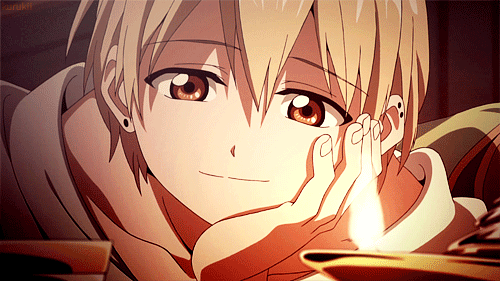
Alibaba Saluja
Alibaba is a very soft and obsessive yandere, one that has fallen so deep in a maniacal love, with an independent yet innocent darling. One that he believes must be kept concealed from this harsh, cold world.
He'll desperately strive to learn every possible little thing about you. He wants to know your favorite color, food, animal, etc. And at first, this may come across as indearing, he takes the time to sit with you, hear your endeavors and triumphs. It's refreshing at first until he becomes too clingy.
Alibaba slowly starts prying you away from your friends, going quite with a heartbroken look in his eyes when you tell him you have plans for the night. Sometimes the looks he gives you, are too much to bear and you cave canceling whatever you previous engagement you had to rest by his side.
"(Y/N) you're my whole world, I never want to lose you!"
At some point in your relationship, Alibaba becomes fed up with others constantly possessing your affection. It's around this point that he'll decide that its better for both of you if you where kept locked up somewhere only he would have access to. This will -obviously- not sit well with his darling and yet what choice are they given. The Wonder Man can be quite forceful when it comes to his interpretation of his lover's being.
"So I'm going to tie you to my heart, so ill never lose you"
Addition Details
Alibaba wouldn't mind taking you outside as long as you have chains around your ankles and wrists. As a simple diversion to those around you, they will pay you no mind if they think you are merely a slave walking around with her master. This will also prevent people from believing anything you say if you were to ever run away and attempt to seek aid. After all who will believe the tales of a desperate slave girl.
He will also permit you to mingle with Alladin, Morgiana, and Kassim. That is if they keep a respective boundary and don't get too touchy.
When it comes to outfits, Alibaba isn't too picky about what you wear, however other than the shackles you are to wear one of Kassim's red earings at all times. His reasoning for this? Simply that he'll be able to look at one of his loved ones and be reminded of two.
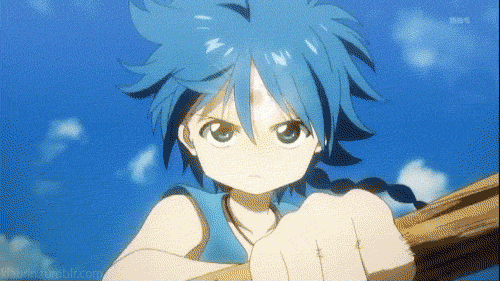
Aladdin
Aladdin is a bit of an odd yandere, he isn't particularly violent unless pushed, he gives his darling more freedom than other yanderes and he possesses both qualities of possessives and obsessives. He's most likely to fall for a darling based on two things, their kindness and their large appearances (Magi fans will understand what that means) they will also have to possess a knowledge of cooking and house chores. To be frank, Aladdin desperately wants a normal family. One with a warm welcoming wife and sweet children, food on the table and someone to cuddle with at night. That's why with the help of Ugo he decided that it'll be best to kidnap his love and keep her in the Sacred Place.
"I love you all so much (Y/N)!"
He'll treat his darling with the utmost respect and heed to their every need and want. His punishments are rather childish and normally consist of the silent treatment or simply leaving their darling alone for a couple of days. At the end of the day you just end up accepting your current role as Aladdin's little "wife" really it isn't so bad, soon you'll even start to reciprocate his feelings to the point of almost matching his obsessive tendencies.
"Don't you love me back?"
Addition Details
He makes sure that you and Ugo become good friends, he will also attempt to make befriend Alibaba and Morgiana.
As previously mentioned Aladdin is not very violent but he will not tolerate anyone other than himself touching you. He will also not hesitate to fight anyone who dares disrespect.
He loves it when you wear slightly revealing tops and asymmetrical skirts, all in shades of blue and white.
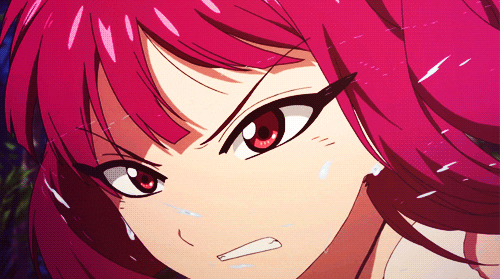
Morgiana
Morgiana is a very considerate yandere that could be best described as a delusional/ obsessive mix. She knows what it's like to be stripped of your freedom and lose all-purpose but to serve your "Master". It's a fate she doesn't wish for anyone body else let alone her one true love. She will never chain you up, never lock you in a room or deprive you of food and water. Everything will appear to be a normal relationship, except if you look underneath the surface it isn't. People around you start to go missing or wind up dead. You mortified fearing that you'll be next, so you start seeking security from Morg who gladly provides you with love and comfort. Non the wiser that she is the one being the homicides.
"Don't worry (Y/N) I'll protect you"
When the two of you start living together, she starts to become a little more possessive. She'll accompany you where ever you decide to go, insistent that you stay by her side at all times even when in the safety of your shared home. In truth, Morgiana doesn't know why she loves you and needs to protect you to such an extent. Maybe because she's never had anyone to protect her, maybe it's cause she's seen the grim reality of this world and wants to shelter you from it. Whatever it is it doesn't matter, all that matter and will ever matter is her love and admiration for you. The punishments that she does dole out are based on humiliation, most of which are sexual. She may start to rub you in public or pinch the right area between your thighs. She'll have no problem with forcing herself on you in front of a crowd if only to show just who you belong to.
Her other methods of keeping you in line consist of making you believe that you'll never be able to live without her and that you need her to do everything for you
"I'll never leave your side!"
Addition Details
She doesn't want to develop a friendship with anyone including her closest friends. Viewing them as potential threats to your safety.
She will, however, intrust Masrur with looking after you when she gets caught up in something.
She very dominates in bed and is very specific about the acts that you two commit. Knowing her strength she doesn't want to hurt you yet she does enjoy seeing you squirming under her.
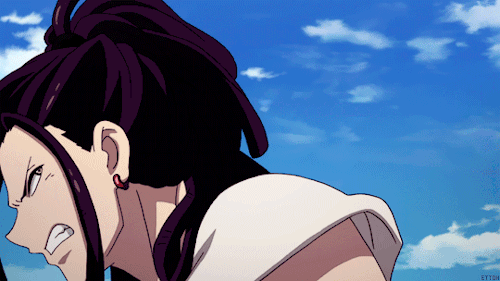
Kassim
Kassim is a possessive yandere, he views his darling as his property, she's an atonement from the universe for all the cruelty he's been through! He quickly becomes infatuated with the notion that someone's sole purpose on this earth is to please him. that's all his love is meant to do. To be there for him, to greet him with a smile and kisses when he returns to his current hideout. She shouldn't think of anything but him, shouldn't want anyone or thing but him.
His darling likely resembles Anise in someway. Be it their kindness towards the members of the slums and fog troupe or their smile or the purity they radiate off of her in colossal waves.
It's something and it's addicting, it's what caused him to steal her away one night under the cloak of darkness. To chain her to his worn-out bed, blindfolded and shivering.
"You're mine (Y/N)..."
He never takes the blame for his actions, always saying it's her fault, she made him do this. It's his only response when he forces himself onto her practice each day, littering her body with sweet tender kisses and rough sharp bites that draw pallets of blood.
When the poor darling tries to pull back or cower in a corner, he'll burn her with the tip of his cigars. If the unfortunate dear ever attempts to escape the punishment will be much harsher. He'll lock her away in some underground tunnel or broken down-home. Leave her there for days antagonist the filth any disease. It always works, whenever Kassim comes to collect her, she's always putty in his hands. Willing to be the sweet little darling he wants her to be.
"Don't you forget it!"
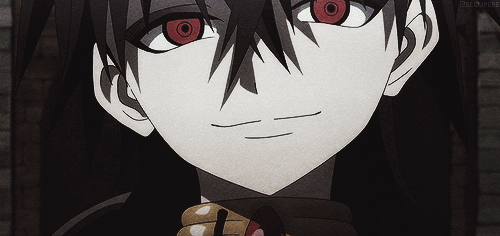
Judar
Judar is a sadistic and cruel yandere with possessive tendencies. He's the type to see his beloved as his toy and plaything rather than a human being a unique though prosses. In his eyes, her only goal in life is to amuse and serve him.
Judar lacks care for....pretty much everything He's constantly bored and seeking some wicked way to quench his boredom. When he first met his beloved he would only see them as a temporary amusement, something he can get a chuckle out of and then slaughter for kicks. But then he notices something about the girl, she's modest, innocent wrapped in a child-like personality. She's his reciprocal, she's what he might have been (keyword might) if Al-Thamen hadn't abducted him and twisted his soul until he became a stygian monster.
The pitiable darling will have no warning as to what's to come, one minute they're in the bazaar and the next, their in Judar's chambers, chained to the wall by a cold metal collar.
"You're supposed to be my pet!"
That's when the real fun begins! Judar's favorite pass time soon becomes tormenting his new toy. He'll beat you to a bloody mess leaving you with broken bones, black eyes, split lips, bloody noses, and too many bruises to count. He'll get off to cutting you, smearing your blood over the both of you. You soon realize just how kinky and uncivil the fallen magi can be. Oh and let's not forget about his ice magic! For punishments he'll freeze the room and have you strip, leaving you in the cold for hours on end. Sometimes he may cuff your wrists and ankles in blocks of ice as he cuts you open with his wand and uses some ice pallets to sterilize the wounds.
However, do note that Judar does try to make you happy from time to time. Buying you the prettiest dresses, making sure you are well fed and entertained. He always kisses you, of course, they are followed by harsh bites. It's just the only way he knows to show his affection, the cruelty and pain are only out of his sick and twisted love. By keeping you locked up and occupied he'll always be in full possession of your undived attention, at the end that's all he truly wants...well sorta.
"So act like one before I kill you"
To Judar this love is Ludus to you it's mania.
Addition Details
Judar rarely ever calls you by your name, he usually has some degrading nickname up his sleeve.
Examples are pet, toy, my bitch, peach, plaything, whore
He always makes you dress in black and gold clothes that are somewhat too tight and revealing. With this being said he does enjoy the occasional Rococo dress.

Hakuei Ren
Hakuei doesn't believe that she's a yandere at first. She just knows that she finds you enticing and exquisite, so she'll stare at you, follow you around from time to time. It isn't until she witnesses you laughing and smiling at some other girl, that rage begins to bubble up inside of her. Visions of wrapping her slender fingers around the other parties' neck plague her mind. She thinks she might be feeling ill, maybe it's from all the stress she's been under lately.
Paimon will likely have to take her aside and explain to her that's she's in love, a dark and twisted one at that! The reason why she's outraged when she sees you with someone else is that she wants you all to herself. These emotions will not cease until she has truly posses you solely to herself.
"Swear your love and loyalty to me (Y/N)"
It'll likely be Paimon that will kidnap you due to Hakuei's manipulated request. However, now that she has you she's doesn't know what to do.
For the first few weeks, she keeps you locked up in her room. Finding it amusing to dress you up and style your hair. Decorating your locks with flowers and pears, slipping on golden tiaras and delicate chains. She makes you look so beautiful that she can't help but to show you to the rest of the royal family. Only this time she makes sure that you won't leave her for one of them. She'll tell you tales about how mean and brutish Emporer Kouen is. How sadistic and cruel the two imperial princes are. She'll manipulate your every step and word to benefit her own.
It works, soon you sincerely believe that the only person you can trust is Hakuei, she's the only one that cares about you, the only one who won't hurt you.
"Swear it!"
Addition Details
Hakuei treats you like a doll, you are not to speak unless spoken to, not to move unless told. You do not own yourself only she can ever possess you.
Her punishments are usually whippings or small beatings. She hates punishing you but you have to learn your place even if it's through strict means.
She enjoys dominating you in bed but while grant any request you have. If you want to try something new she'll be all for it and will make sure that you enjoy it too.
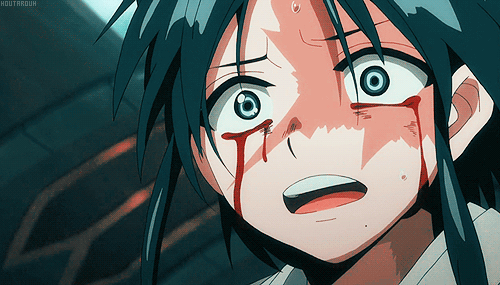
Hakuryuu Ren
Hakuryuu is an odd yandere, at first he'd be fascinated with your courage and bravery, how independent and strong-willed you are. That fascination will very soon turn into an obsession. He'll soon find himself following his beloved around, trying to steal glimpses into her room, secretly stealing small trinkets of hers.
In his eyes, you are perfect, a goddess of war with the most beautiful eyes and shimmering skin. You are his everything he'll gladly lay his life down at your feet. Except you don't seem to notice that, you don't even acknowledge his presence. This lights his heart on fire and now he's desperate for your attention.
"You love me right (Y/N)?"
To Hakuryuu he has to find some way of "winning" you. It takes him the longest time to figure this out, to fully grasp what he has to do. But once he finally decides what to do no one can stop him. When he finally takes you, hiding you away in his private chambers where you will be safe. In his eyes this is the final step, he won you it's game over.
He doesn't view keeping you captive as wrong or unlawful it's merely his way of protecting you from the awful creatures outside, those who do not appreciate your true beauty and could never love you as he does.
Hakuryuu does have very strict rules in place one's you are to follow without question. They're for your good after all! He wants to keep you perfect and brave and his. His punishments are harsh but short, he hates hurting you but he has no other choice, you forced his hand! Normally he is very merciful and may even let little things slid. One thing he will never tolerate however is escaping. If you so much as open the door without his permission, he won't hesitate to lock you up in a cell in the palace dungeons leaving you there until you are begging him to let you out. Promising to be a good darling and do anything he says.
"Say it! Say you love me!"
Addition Details
Hakuryuu adores dressing you in the finest robes and walking around the palace with you. He ravishes the looks that others throw your way, seeing the sparks of envy in their eyes always put him in a lighter mood.
His favorite person to show you to is Hakuei, he wants his older sister to be proud of the darling he caught. it's a lot like a small child showing their newest artwork to their mother.
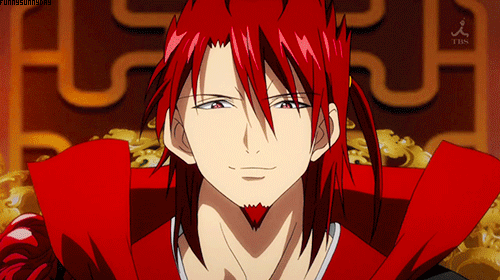
Kouen Ren
Kouen is a possessive and controlling yandere, at first, he views his darling as merely a possession, one granted to him because of his role as emperor and also due to his numerous victories on the battlefield. He doesn't always treat his darling as an equal or with much affection and admiration for that matter. Really he simply expects his beloved to sit next to him on her own throne as a glamorous doll of a queen.
He's rather fixated with the thought of morphing you into the perfect darling, into the most elegant and obedient queen the Kou empire has ever known! His methods for doing so are strict and rather unsavory. He has rules in place for everything, a routine you must abide by throughout the day, he monitors and manipulates every word you say, every step you take. Everything his always under his control!
"My queen, you weren't supposed to utter those words."
Eventually, you will start to absorb his ideologies, wholly believing that your sole purpose in life is to be Kouen's perfect little queen.
You will do anything to please him, carve the rules and routines into your mind and soul. Only feel truly alive when he kisses you softly sucking ever so slightly at your bottom lip, pulling away to whisper how proud he is of you and how pure you're turning out to be!
"Now I'll have to punish you."
Addition Details
His rather lax when it comes to sexual activities, he likes to be in charge but doesn't mind if you wish to dominate him and usually encourages it. He does, however, reserve requests for when you deserve a phenomenal prize.
His rewards vary vastly, from new outfits to new privileges, to someone new to talk to or fresh words you are permitted to speak.
Kouen's punishment methods are usually different forms of bondage, for example, tying you from the ceiling from your wrists.
Or spreading your limps apart and to a different corner of the bed.
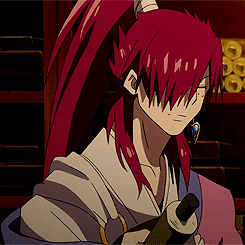
Koumei Ren
Koumei isn't a very crazed yandere or very demanding. He's an obsessive that desperately want's your company. When he first kidnaps you, that all he wants, someone to talk to hidden away in the safety of his room. You'll spend may days and nights simply chained to an overly decorated and engulfing chair listening to the second imperial prince go on and on about his newest war strategy for conquering a new land or favorite book.
However nothing lasts forever, soon Koumei will expect you to start doing chores such as organizing his books and scrolls, filing his military tactics, cleaning and dusting the room. All the things a good housewife should do. He is obsessed with you, this is a fact but he's also convinced himself that you're already his wife that you already love him and that to an extent you don't really want to leave him.
"My gorgeous, stunning (Y/N)..."
Every time you attempt to escape, you end up coming face to face with your captor, a knowing smirk decorating his features and a triumphant glint in his magenta eyes. You're always brought back, yet never punished Koumei just claimes that you're either bored and looking for a source of entertainment or were attempting to gain his attention because you missed him direly.
Koumei also slowly begins to get more touchy the longer you reside with him. He'll embrace you more often, with his hands running along your back, nails scratching lightly at your tender flesh. He constantly has you sit on his lap or hold entwine your fingers with his. It doesn't matter how it is, he simply has to feel you in some manner or another.
After some time you slowly begin to adapt to his hermit-like ways. Becoming to scared of the outside world yourself. A form of apathy grows within you, it becomes to much trouble to escape too much effort to beg the servents and staff for help. Life is much easier and simpler to just remain in Koumei's room. Being his little housewife is just a life that seems to suit you more than whatever you did with your existence before your lover captured you.
"Kiss me"
Addition Details
Koumei is rather shy during sex, your first few times. He slowly begins to adapt more to your body as time progresses. He quickly learns that he really really enjoys blow jobs. He loves how you feel around him, it's pure ecstasy to him.
He does want his darling to feel comfortable around his brothers and sister along with their respective darlings. His family means a lot to him and thus he wants his darling to feel included in it. So he humors Kouha and Hakuryuu's little darling competitions even making you and himself the judges.
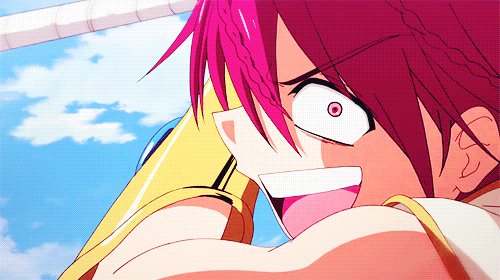
Kouha Ren
Kouha is a bit of a complex yandere, his tendencies border on possessive and sadistic, yet at times he is sickly sweet. Kouha will kidnap you, will force you to become his doll, his toy and his lover.
He keeps you chained in a personal room he had customized solely for beloved. The room itself is luxurious, with an enormous closet filled to the dream with a multitude of clothes. Shimmering ball dresses, silky hanfus, delicate dresses both short and long imported from all over the Kou empire, even graceful linger that shows off more skin then it should. And that's just a minuscule portion of your wardrobe. You're given every piece of jewelry imaginable, every style of shoes and accessories. There isn't a thing that Kouha wouldn't give you!
"My sweet doll..."
However, there is a price to pay for all these lavish gifts. Kouha expects you to be at his beck and call, to pleasure him in any manner he so desires. This can lead to certain unsavory events... Kouha is very rough and commanding in bed, the things he wishes to do to you are very painful and extremely taboo. He will mark you and cut you, tearing at you delicate flesh, decorating it with kisses, bruises and little cuts in shapes of hearts.
Kouha's favorite thing is to dress you up all elegant and porcelain-like and than to just cuddle you. Nuzzel your neck and breath in you sweet sent, tangle is slim fingers in your silky locks, watch as the light illuminates your dazzling eyes. He'll give you the softest kisses on your sweet spots practically worshipping your body.
"Behave or I'll have to punish you!"
Addition Details
Kouha does enjoy flaunting you around, making everyone so envious of his adorable and well-behaved darling.
If you've been extra good than Kouha will let you mingle with Kouen, koumei, and Hakuryuu's darlings. Oh, but of course you have to be dressed to outshine them all.
Actually, Hakuryuu and Kouha constantly compete to see who's darling is better! Not simply by outward appearance and outfits but also in manners and how much love they give their yandere.
Kouha's punishments are the most damaging and painful to endure. they vary from classic torture methods (such as burning her with boiling water, adding salt to fresh cuts, dislocating and/ or breaking bones) to sexual humiliation. Forcing you to set on his lap during a meeting is an extremely skimpy dress with his fingers plunging into your womanhood. Or taking you in front of his servants and whoever else would enter the room.
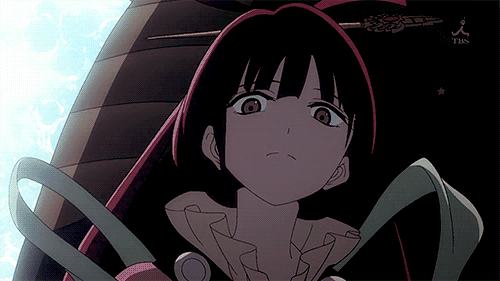
Kougyoku Ren
Kougyoku is a manipulative and jealous yandere, she knows that she doesn't own you but she wants all of your actions, wants to be the only person you care about. She doesn't mind what tactics she must use to get you undevoted attention wheater it is clinging to your arm or kissing you in front of the royal court, it doesn't matter!
"You’re so cute (Y/N)!"
She won't outright kidnap you but she (Along with Kouha, Kouen, and Koubun Ka) has made it very clear who you belong to and that you have no say in the matter. She'll constantly request your presence in her room and will get pushy and invasive if you deny her request.
She can be slightly cruel and sadistic in her punishments. Enjoying how to scream and cower in pain. Sure she feels ever so slightly bad that she is casing to suffer but how else will you learn not to disobey her?
" Cute And mine!"
Addition Details
You always have to be pressed perfectly, in the finest and cleanest clothes. Only pure gold jewels decorating your flesh. Not a single hair out of place. Kougyoku insists on doing this herself each and every day!
She has a pretty high sex drive but finds that she's a big fan of watching as you play with yourself, she might join in or just start playing with herself as she listens to your sweet moans.
#yandere#yandere x reader#yancore#yandere x you#yandere magi#magi#magi judar#yandere judar#magi alibaba#yandere alibaba#yandere aladdin#magi aladdin#magi morgiana#yandere morgiana#magi hakuryuu#yandere hakuryuu#magi hakuei#yandere hakuei#magi kassim#yandere kassim#magi kouha#yandere kouha#magi kouen#yandere kouen#magi koumei#yandere koumei#magi kougyoku#yandere kougyoku#magi labyrinth of magic#yandere imagines
843 notes
·
View notes
Text
Fixing Afterlives: Bastion, Pt. 1
As it is, Bastion doesn’t work. The Forsworn don’t just have a point, they are obviously, objectively correct. Kyrian discard all their memories and attachments in a way that is horrifying, in order to perform a job that a robot could do, in order to aspire to be something lame and boring. There is nothing cool about what they do and nothing good either; every single time they tell you about what they do it’s supposed to make you sad, not proud. A little of that is fine, it’s Death. But come on. The anima diverter daily for Bastion is a test where you judge if souls should pass on or not, and on WoWHead, the adequate summary of the right answers is “If one of the answers seems more evil or horrible, that’s the one you pick.”
In fact, Bastion can’t work as it is right now, because of Maldraxxus. The Maldraxxi are the defenders of the Shadowlands, right? So all the courage and martial prowess and avenging angel-ness Bastion wants to have cannot be what they are About, the presentation wants them to be glorious and valorous warriors but they don’t have to fight anyone. And the presentation wants them to be wise and impartial but their job requires no discretion, they’re ghost UPS. They can’t be About anything cool, and to be wise and impartial, they can’t be DOING anything at all!
So here’s the fix to their concept: Maldraxxus is the afterlife of warriors, the endless skeleton war, the unending conflict where there are always an infinite supply of fighters willing to leap to the defense of the Shadowlands. Maldraxxus is the Shadowlands’ defensive team. Bastion is the offense.
Bastion does not engage in army-against-army conflict, they have individual heroes. And they are out there in the mortal world, invisibly, serving as guardian angels, inspiring as muses, fighting invisible forces, tipping the scales of Fate to have the right outcomes. Fighting extra-dimensional beasts who prey on the mortal realm to invisibly protect them, fighting down incarnate ideas of malice and ruin, but also influencing things directly or by subconscious example. Every Spirit Healer is from Bastion and they are the ones who decided “your time is not yet up”. When we get really lucky to allow ourselves to triumph over the Legion or the Scourge, it’s because Bastion was ensuring it happened, fighting for us. Bastion is supposed to be affecting things out there, making things turn out Right, instead of being powerless observers. They are the muses of artists and the muses of battle. They inspire. They lead, invisibly.
That’s why they need to be wise and free of bias -- you cannot favor one side of mortals over the other. Mortal beings need to beat the Scourge, but the Horde does not need to triumph over the Alliance and vice versa. Your job is not to punish mortals for being bad, you damn well need to be boosting both sides when there are champions and the valorous in both. You cannot go out there and say “these Orcs up here in Redridge are all evil and shit and the Alliance deserves the win so I’m just gonna go all in on defending them,” that’s not how it works, you reward individual valorous efforts on both sides. How Fate Should Go does not include taking sides in purely mortal conflicts.
So obviously you cannot be biased. You are something Beyond the mortal realm which means you can’t take sides. You actually do have to discard these attachments, and while we’re here, we need to actually make that process empowering. Right now all it does is show you “hey, happy memories, well, fuck you, gotta get rid of them.” Make more than zero effort to make this make sense. Show the aspirant in pain and yearning because of those memories and the fact they can’t come back. Don’t make them forget who they were, make them become at peace and move on.
Now obviously that won’t be convincing to everyone. And that’s fine. It just means there’s some ambiguity instead of the Forsworn being obviously right about everything.
There are four races/types in Bastion: Kyrian, Forsworn Kyrian, Stewards, and Constructs. Only two are represented in Soulbinds: you have two Kyrian and a Steward.
Kyrian are the expression of what Bastion IS, so we already covered their changes.
Constructs are anima robots. Why are there anima robots here? It’s really bad in the current version because the Kyrian job can be done by a robot so why not just make them do it? Instead, we take that idea and we make it About something: these machines aren’t Constructs, they are Principles. A Principle is a robot made of rules and ideals, the things that are thought by mortals but bigger than any mortal. Codes of honor and ideas that work beyond any of us as individuals. There, that’s it, that change of presentation is all you need to do to justify why robots are there. The changes to Bastion’s fundamentals are what makes them fit in.
Stewards are creepy. Really creepy. They serve the same role as dredgers, but the fact that dredgers bitch and moan and complain all the time lets us see them as individuals with goals and not creepy brainwashed victims. A dredger isn’t a slave, they are a worker; but work sucks and they wanna be at the pub. A steward, with one exception (Forgelite Prime Mikanikos who is busier than a one-legged man in an ass-kicking contest and also by far the best Bastion character) appears to have no personality and is a brainwashed slave.
So, first off, make it clearer that they are helpful because they are The Desire To Aid, that’s the thing they’re About. With the way they speak and act, I think what they are supposed to be in story terms is lightly comic relief, also similar in role to Dredgers but with opposite implementation. The creepiness and one-dimensionality make this fail, all their hoots and hoos and silly talk isn’t funny. They need to be cheesier. They need to be 90’s Saturday morning cartoon sidekicks. They need to be a (much) less obnoxious version of Snarf.
They need to tell awful, awful dad jokes. Just the worst. The kind that are so bad they loop back around to funny again but you’re still groaning and they’re just there like “Eh? Eh? Geddit? Geddit?” By doing something that is helpful, that we recognize as an attempt to help and that some Steward characters can explicate to us really does help (it dampens anger and fear because all of your negative emotions are refocused to that HORRIBLE pun), but that clearly NOBODY would brainwash them into doing, now we can trust their helpful efforts are borne of sincere desire and carried out to the best of their ability by their own personal interpretation.
Forsworn Kyrian, right now, are only antagonists. The ideological change of giving up on the law of Bastion makes you turn a darker indigo color scheme (which is actually really good because these are creatures of Beyond, creatures who are on a fundamental physical level About something, their beliefs changing their physical makeup makes sense!) and then become a bad guy. Forsworn are all only antagonists. We’re going to change that. Kleia is going to become Forsworn. And still be a heroic character and your Soulbind, even though this isn’t a game balance thing and so Pelagos will still probably outclass her in every way seriously that Mastery buff is fucking bananas for anyone who cares about Mastery.
Not when you meet her, though. The existing storyline of Bastion is you go there because “hey what the fuck are these Kyrian doing in the Maw serving the Jailer” but in Bastion itself nothing much is happening other than kicking pebbles down the street. You get the intro from Kleia, you go see some very low-importance things, then the Forsworn attack for the first time, and you spend the rest of the zone quest on hold with the Archon’s hotline to tell her “hey there are Forsworn this is a problem”.
Now, when you get there to ask “hey what the fuck”, Kleia is still not doing much more than kicking pebbles down the street, bored off her ass, extremely enthusiastic about someone new so she can DO something. But the Forsworn conflict already exists: it’s just not relevant to her because she stays out of it, figures that it’s above her pay grade, and she hangs out at the Welcome Center which nobody gives a shit about because there’s nobody to get welcomed so it isn’t relevant. She just knows there’s been some discussions.
We get the anima drought reinforced the first time we enter Bastion because we have to power down the other cores to get enough juice for the greeting machine, but then it isn’t really a good way to sell it because that’s the kind of thing we do all the time even when there’s no shortages of anything, that’s how WoW PCs interact with machines. So we have the player scrounge up anima from the other Principles to power up the greeting machine, and it’s not enough, it runs out of juice halfway through, and Kleia gets embarrassed and tries to finish the rest of the process by reciting it from memory (and not getting it all quite right, which is another chance to show us things about her).
Kleia is excited to have someone to run through the orientation process, and she explains that FIRST there was an anima drought, and then as if that wasn’t bad enough, THEN the Arbiter got conked out and the flow of souls to Bastion stopped. This is important, because in the story as is, the anima drought appears to be completely explained by the flow of souls all going to the Maw, since they are presented at the same time and the flow of souls is the flow of anima. When you find out the drought is because of ol’ Denny hoarding it, you go “wait how does he have any to hoard when it all goes to the Maw?”
So for right now you need to walk the Aspirant’s path to get an audience with the Archon because right now things don’t seem desperate and urgent. You go to Aspirant’s Rest and get the flight point, and you go to meet Kleia’s soulbind, Pelagos. Two things need to change right here.
One: something more needs to be happening here than “Pelagos was a dipshit and tried ascending alone despite that being not how it works at all, go in there and fight the monsters,” so do something instead of almost-nothing.
Two: Loath as I am to say something actually needs less representation compared to its original, Pelagos can’t be transgender. You find out later on, in the Kyrian covenant quest line maybe? That Pelagos’s mortal body was a woman, but his true spirit is a man. That’s great, that’s something that should come up. The problem is, Pelagos is also the fuck-up, the one we see fail all the time so he can (ostensibly) show resolve and get back up again. But Blizz didn’t show barely any details about Pelagos’s life for fear of backlash -- we don’t even know who played him -- and whether or not it is valid or invalid or that was a cover to avoid admitting this was to not offend China, Blizzard still won’t DO it. So we have this character who is battling this doubt and failure in his past but we’re not allowed to know what they are. Pelagos is cisgender so we can go into detail about what he fucked up. Kleia might be trans instead (why she is so gung-ho about Ascension), or we can have Kleia sell the Ascension process as good by mentioning that the Paragon of Wisdom, Thenios, was born a woman in life but Ascension made him into a true ideal. This can also justify a bit more screen time for Thenios and then something for Tim Russ to do. He was already Tuvok, he doesn’t need more humiliation. But whoever it is, their gender only comes up once and never again because now they’re the right way around and the former body doesn’t matter.
So what’s happening at Aspirant’s Rest? It’s a holding pen for souls. See, as it is now, you find out about the flow of souls into the Maw right away, but then all the way through the main quest and into the Kyrian campaign quest they apparently don’t know, and you don’t tell them, and then it’s a surprise when you finish the quest where you follow the guy in Redridge and have to take him to the Maw, and that’s dumb, they should know, you should have told them.
So now the Kyrian know that everyone is default-judged to the Maw. And they know this is what has to happen, this is the machinery of fate that drives the universe, but they are compassionate and know these souls do not deserve it. So they’re scamming as much as they can. Whenever possible (which they lament is not often enough, not nearly often enough), they find some loophole or corner case to count someone as not ready to be judged, and stick them somewhere in Bastion so they can wait until the Arbiter’s awake again to judge them. They can’t do much, but they can do a little, so they do that.
This guy, okay, you died, BUT, there’s a necromancer just two zones over, and your body is still intact since I dragged it to safety, and, I mean, he’s PROBABLY going to call back your soul and bind it to your body in service, so there’s no point in having you judged, you’re just coming back, right? And you, Night Elf! Okay, you got your head blown off, but, remember that angelic voice shouting “NIGHTELVESEVOLVEDFROMTROLLS!” a moment before your demise? And you know, Trolls who worship Bwonsamdi go straight to De Otha Side without being judged. Maybe you would have wanted to pledge yourself to older gods, but you never got the chance to make that decision, so, hey, you know, it would only be right to let you make that choice before you are given your judgment! And you, guy, did you know that all those patrons from the Slaughtered Lamb across the street who came into your business were warlocks? Yup, all of them, and they didn’t wash their hands either. Fel contamination. Can’t, ooh, you know, hey, might be a demonic stain on your soul, demons don’t have an afterlife like us, gotta be reborn in the Twisting Nether! Going to have to consult some demons to figure out where you go. Better wait here.
Aspirant’s Rest and the temple beneath are a soul refugee camp, and the souls within are scared and angry and don’t know what is going on and the Kyrian can’t explain it or they will all completely flip out. The Kyrian are trying as hard as they can in the limitations they have and this sells it.
Pelagos is down there. The risk is not that he will be killed -- he is not mortal, he does not die -- the risk is that his well-meaning attempts to keep things calm might ignite the powder keg down there. And those souls can’t die but they WILL go directly to the Maw if fatally injured, which is why they have to be kept penned where Larion won’t eat them and Principles won’t drag them off. Pelagos fucks up here and you have to fix it but it’s not a suicidally stupid error while doing something that has no relevance to the player, it’s an understandable mistake biting off more than he can chew while doing something the player understands. Player, Kleia, and Pelagos go down to Aspirant’s Crucible to get certified as an Aspirant and get in line to talk to the Archon.
In the existing story, you go and peer into a memory flame thing and have echoes of your heroic battles drawn forth, and you fight them while a character narrates your heroic deeds. They might be based on what expansions you played in, or might be random? Anyway, in this case, you gaze into the flame of memory, she starts to narrate your heroism, and… nothing. “Ah, there are supposed to be visions conjured here, so you can display your valor against them once again. It… it doesn’t… hang on, I might know what the problem is…”
A voice comes. “Then how about you display your valor against me, champion? A little sparring wouldn’t hurt, and I’m eager to see what you can do.”
It’s Uther, hell yes it’s Uther.
5 notes
·
View notes
Note
I'd ask this on your Lisa sideblog but you don't have anon on and I'm shy lol, but do you have any headcanons relating to Lisa the First? Like Lisa's views on religion, her relationship with her mother, if any of the various worlds we see mean anything?
hoh man i didnt even know anon wasnt on LMAO... ill turn it on after i post this!
also fuck YEAH i do holy shit i fucking LOVE lisa the first!! i know its sort of the black sheep of the lisa series, since it is a completely different type of game and was clearly austins first game, but i fucking ADORE it dude. the music - which he made ENTIRELY IN THE FREE TRIAL OF FL STUDIO BY THE WAY - is FANTASTIC, the art direction is actually pretty fucking incredible for an rpgmaker game that uses a good deal of basic assets, and the gameplay.... ok yeah that part is a bit lacking but its a yume nikki-style game be nice it was his first time LMAO
ANYWAY back to ur question. first and foremost, i think this is not even a headcanon so much as straight up canon, but lisa DESPISES christianity. marty is christian, probably catholic given the golden crosses everywhere, and he is a fucking scumbag hypocrite. lisa likely associates all of christianity with this line of thinking, as there is one room in the bile area where the melted martys (although i suppose we can just call them joy mutants now LMAO) simply stand in a circle surrounding one big cross. the role of the melted martys is up for interpretation of course, as is everything, but after playing the painful and seeing them described as “mindless sheep,” i think this is how lisa viewed them. so they likely represent other people that, to lisa, are probably just as sick and disgusting as marty
lisas relationship with her mother... i go back and forth on this one a lot. i can never decide if i prefer the headcanon that lisas mom died in childbirth, and so lisa never met her, or if i prefer that lisas mom was around for a very short time and then either left or died. the fact that she says “i didnt want to leave” at the end of the first leads me to believe that she most likely died. in either case, the memory of her mother was clearly important to lisa, as she wears her pendant through the entire game and its explicitly noted as being a gift from her. in either case, i think that the death/absence of the mother is heavily implied to be the primary cause behind martys descent into alcoholism and lisas abuse, since the white room strongly implies that marty did at one time sincerely love and care for her as a father properly should
as for the meaning of each of the rooms, i think most of them are fairly self explanatory, but some of them are a bit more vague, so ill break it down in terms of how i see it (and ill put them under the cut because its long as hell):
martys house - this is the most literal one. pretty self-explanatory. the dark, yet vibrant colors and the ear-bleedingly loud tv are pure sensory overload, something lisa probably deals with on a regular basis. when lisa goes outside and it turns into a sky of marty faces, i think this is the transition into the psychological part of the game
the lobby - this is honestly just pure yume nikki ripoff LMAO... but if i had to ascribe a symbolic meaning to it, i think its probably a quiet and safe area for lisa to retreat to in her mind when she needs it, but even that eventually gets sullied as tricky rick makes his way there, too (and tells her hes “just waiting” when she talks to him). the majority of gameplay is lisa searching for items with which to kill tricky rick, who always abuses and disparages her whenever she talks to him, telling her she’ll never forget. as for the reason why... well, take one look at him and its pretty clear whats going on there. (the name is also a reference to richard nixon, whose nickname was... well, you can figure it out!)
the town - the bar area is 100% my favorite from this world; lisa clearly hates alcohol and anyone who drinks it, associating them all with marty, and that music... all i can say is YUCK. the entire section also consists of lisa having to give up something in exchange for what she needs to move on, and usually getting the raw end of the deal out of it (she gives one marty a banana, he gives her a banana peel in return). she does all that while avoiding a marty following her outside who repeatedly tells her “you cant escape,” and upon reaching tricky rick (who is atop a narrow, columnar, PINK mountain), it becomes pretty clear whats happening to her.
the sea room - fucking marty spiders man. im assuming they represent the sickly feeling of crawling skin she gets when she looks at him or is anywhere near him, but holy GOD they are annoying to deal with. she kills tricky rick with pills here - we dont know what kind of pills these are, but i interpret them as sleeping pills, and given the rumbling music and the rapid cycling marty background, i wonder if he forced her to take these. marty is everywhere here, but the only one she can speak to is seen chilling on a raft of some kind. marty likely spent much of his time recreationally, i.e. drinking, so it makes sense why this would be here
the rope room - theres no symbolism here this is just pure comedy (LMAO). if i HAD to assign some meaning to this area, it would be that lisa likely is so despondent at this point that putting in effort to do anything feels utterly pointless, much like climbing this long-ass rope was
the white room - as i mentioned earlier, i personally believe that this area depicts the previous relationship between marty and lisa (and also has one of my favorite songs in the game). he is shown doing traditional fatherly things - he is no longer wearing sunglasses and is wearing a suit, meaning he was likely employed, and is actually smiling. he also spends time with her in a completely platonic, familial way. when she interacts with him, there is a little heart over his head. after lisa walks through the golden statues (which will reappear later), the entire world becomes filled with bile, and martys appearance returns to that of the other martys, but with an extremely warped, grotesque face. the item she needs in this area to kill tricky rick is found between two golden crosses.
notice that all of the items she kills tricky rick with - a razor, pills, and now a plastic bag - are things that a child could plausibly get their hands on; none of them are explicitly weapons. i think this shows both her age and how often she must have considered using those things against him.
the bile room - probably my favorite area in the game, and also features what i consider the quintessential lisa song. this area really drives home lisas disgust with marty and with christianity as a whole - it almost certainly has the highest concentration of crosses, and it is also quite literally covered in wall-to-wall bile, dirty water, and disgusting houses. a lot of the most graphic sights, like the melting martys and the pond martys (no idea what to call them LMAO) are here, so i think this is pretty much the lowest circle of hell for lisa. marty gives lisa a freshly cut finger in exchange for a napkin here; im not necessarily sure what that represents, but i think the napkin was used by marty to masturbate (as he says “i needed that” after he takes it), so perhaps the finger is martys?
lisa kills tricky rick here in a cave that is not-so-subtly shaped like a penis, and gets a vhs tape in which he pretty explicitly states what is going on in the game; he even pretends like he doesnt know who lisa is at first, which somehow makes it even more disgusting. the fact that vhs tapes play a role here sort of makes me wonder if marty really WAS filming some of what he was doing, and given that lisa the joyful confirms that brad was forced to somehow participate in lisas abuse, that is.... horrific to think about, honestly
the marty tape - this tape just has the player (as marty) walk up to lisa and suited marty, who are having a tea party with a plastic tea set. they both get hearts over their heads if you talk to them. i think this drives home that he and lisa did once have a normal relationship, and perhaps theres some part of marty who misses that? theres a LOT of ways you can interpret this; having the player become marty really calls a lot into question.
the mansion - the room leading here has a marty staring directly at the player who informs lisa that she needs a sword to progress. unsubtly, the sword must be placed into the crotch of a womans statue. the mansion inside is beautiful and ornate, and easily the most gorgeous area in the game - and it all leads to what appears to be a proto-joy mutant marty, sort of looking like jabba the hutt. i dont doubt that this is intentional, given that jabba the hutt is associated with slave leia, and its not at all a far leap to call lisa martys slave. the golden statues of women, as well as many golden crosses, are everywhere in this area. its actually quite a large space with a lot of thought put into it, so im really upset that i cant figure out more of what it represents LMAO
the final area - lisa seems to go back to her actual house, but upon leaving her room and entering whether the living room would be, the whole area changes. she encounters herself in a blood red room, but when she talks to the other lisa, she turns into marty. i think this represents a clear question - who is lisa without him? IS she anyone? or is she just a vessel for him to do with what he pleases? she encounters a naked marty telling her to give up shortly after, and flees from him, but is followed by voices repeatedly telling her that she must accept her fate. i think this clearly show the mental state of lisas last days. she was tormented, eternally. she truly felt there was no escape from marty. even the background becomes nothing but martys face, over and over again, as the end screen flashes.
at the end text, she finds a video tape, and in the tape sees someone who is ostensibly her mother from behind. she apologizes for not being there for her, but when that figure turns out, its martys face that she sees. the sky turns into marty. the music becomes corrupted and overrun with pretty fucked up laughter. she tries to run, but marty is already everywhere. theres nowhere for her to run. and then the game is over.
note that the video tape comes AFTER the games end screen, which stops not long after the appearance of the naked marty. so i personally believe that the “game over” represents her deciding to take her own life, rather than just give up and accept her fate. by running from him into the blackness, she got away from marty the only way she could have. it is sad and horrible, but that is honestly the best ending that she could have gotten in this game.
the first is definitely not as good as the painful in terms of gameplay, that much i can agree on, but i really think people miss out on a lot by not playing it. i think its really crucial to see lisas life from her own perspective before you can see it from brads - after all, brad may have known more than anyone else about what was going on, but he did not experience it like lisa did. for brad, lisa is a symbol of his own regrets and failures, but lisa was a PERSON (well, in-universe anyway LMAO). she suffered on her own, with pretty much no one to help her, and then she suffered so much that she couldnt take another second of it.
#anya's anons#long post#lisa the first#ok NOW im gonna open my anons on my sideblog LMAO#i got wayyyy too into this#and i had to put it under the cut bc its really hard to not be graphic about the first given the subject matter#rape mention#abuse mention#lisa
11 notes
·
View notes
Text
The Ruin of Kings Book Review
The Ruin of Kings Book Review by Jenn Lyons

Boy, oh, boy, was this a wild ride.
Those of you who have been following me for a while know that I occasionally delve into adult fiction here and there. I mainly stick to my vegetarian course of YA novels, but every once in a while I can’t help but pick up a slice of bacon, or in this case, an adult fiction book.
Or, even more specifically, I suppose it would be more accurate to say that it’s adult fantasy instead of fiction. High fantasy at that, which is characterized by a whole new world with fantastical elements and not just a novel in the known primary world with fantasy elements.
With that literary lesson out of the way, let me get started.
The Ruin of Kings by Jenn Lyons came recommended by one of my favorite book bloggers, Paperfury. She counted this as one of her most recent book obsessions she couldn’t stop thinking about and in general I trust her judgement (although she was way way off on The Queen of Nothing, yikes).
This massive installment is definitely not the short and sweet page length I’m used to with YA, and neither does it have the comforting and large font that makes me feel like an accomplished reader after just an hour of skimming.
No, this installment is large and beefy and could probably give someone a concussion if you threw it at them, so just keep that in mind.
The whole fantasy revolves around a boy named Khirin. Khirin is your typical fantasy hero, equipped with the luscious blonde hair and the sparkling blue eyes and most importantly, the wickedly sharp tongue reminiscent of a male character from the Cassandra Clare universe.
He’s sharp, he’s witty, he’s charming, and he also has terrible, terrible luck.
Or does he?
When you first meet Khirin he is being sold as a slave to the highest bidder. He’s cold, he’s injured, he’s starving, and he’s broken. You, as a reader at this point, are completely and irrevocably confused.
You’re thinking: Who is this boy? What is happening to him? Why are people betting so much money for him? What’s with this necklace around his neck? Where did he come from? Where are we? What world is this? Where is he going? What the hell is going on???
To say that Lyons starts out strong would be underhanded hyperbole. You are forcibly drop-kicked into the fantasy world of Qurr and its many raging empires and states, and putting them all together is frankly daunting and largely impossible until a good chunk of the book is devoured.
Frankly, I still have trouble figuring out all the locations and gods and god-kings and factions and lore and people and how they’re all related, Game of Thrones style. But that’s part of the fun.
One of my biggest complaints with YA is that the reader is generally treated like they’re pretty stupid.
Often a YA author feels the need to explain every single iteration and modicum of interaction between their characters or spend too much time describing things, and it leaves very little for interpretation or inference on the side of the reader. Lyons is almost the complete opposite, which is as refreshing as it is frustrating.
As you are introduced to Khirin and this gargantuan universe that Lyons has created, you will feel stupid. To be fair, I enjoyed it most of the time. I relished the challenge of learning to differentiate all the different families of the Court of Gems, of distinguishing the Goddess Thaena from the Goddess Tya.
I liked when I was finally able to smugly look at the map at the beginning and recognize all of the city states like Doltar or Kirpis or Manol. I liked when I understood the different races like the Thriss or the vané and the implications of what that meant.
If that was a whole load of word vomit for you, that’s okay.
Again, it’s part of the fun.
What I do want you to get out of this, however, is the knowledge that Lyons has created an expansive universe with multiple creatures, including dragons and witches, rivaling royal families, gods reminiscent of the Greek Gods and their interference with human affairs, a rivaling world split with so many seams that you’re not even sure who to root for, an emperor, magical jewelry, demons and even a dose of piracy and musical competition.
This book honestly has a little of everything — which, to be fair, it should, considering how damn long it takes to get through it’s never-ending pages.
To make this as simplified as possible, the plot goes like this:
Khirin is sold into slavery and finds himself in the hands of a group called the Black Brotherhood. Over time, Khirin learns about this group and their intentions, learns more about himself and the Stone of Shackles (the necklace he wears around his neck), divulges his past and how he got sold into slavery in the first place-his upbringing, his musical talent, his stay at the Blue Palace, his eventual betrayal at the hands of someone he loves.
You learn over the course of each chapter what brought Khirin to his current fate and more of what he is trying to do now,: which is to return home and save the world from the likes of the two main antagonists (although not all of them by any means), Gadrith and Darzin.
I’m not exaggerating when I say that is the most bare- bones summary I have ever written. But honestly, this book is about a hero named Khirin and his adventure to rid the world of evil as he learns about himself and his past.
Like many, many, other books before it, this book explores what it means to be a hero, what it means to be a god, what it means to be involved with the fight of good vs. evil. This book is not special in that sense regarding these themes.
However, there are some really cool aspects of this novel that I thoroughly enjoyed that I’ll relay now that the summary (as condensed as it is, sorry) is out of the way.
The two things I enjoyed most about this book were the writing itself and the POV. Most high fantasy novels that I’ve attempted to read have this ridiculous notion that every character must speak in some dead medieval language rife with historical inaccuracies and banal, clipped speech. Lyons does nothing of the sort.
Her characters are creative and crass and downright funny. The dialogue is immersive and natural and oftentimes, other than the backdrop of a dragon or lizard-people, it felt like two modern-day people were having a conversation, which I greatly appreciated.
Lyons is also a very big fan of building up her writing and then smacking you down at the pinnacle. For example:
“Before us lay the Mother of Trees.
I didn’t understand what I was seeing. I couldn’t comprehend. It just seemed like a humongous wall at first, one that had been built up with palaces and verandas, graceful pavilions, and stained-glass windows glittering like jewels. Only when I looked up could I perceive the sweep of branches, the distance velvet of green leaves. This was a tree to hold up the whole world, the sort of place where Galava must live, if any place were consecrated to her. It seemed ageless and immortal, a tree that had always and would always exist.
Naturally, we were setting it on fire.”
I personally found this style of writing hilarious. Lyons often built up the tension, beauty, or conflict, and then would deliver these one-liners that would leave me gasping with laughter. This creative juxtaposition was super enjoyable and one that made the book a big success for me.
Secondly, while this book is told almost entirely (keyword almost -there are some outlier chapters) from Khirin’s perspective, it technically oscillates between present Khirin and past Khirin.
The whole book switches from one timeline to another every other chapter, with the chapter starting with Khirin being sold into slavery being the “present” and told from Khirin’s first-person POV and then switching the next chapter to his “past” and being told from Khirin’s third-person POV.
I loved this. I thought this was so creative, and up to this point, I have never seen this done in another book. The subtle shift from first to third person every chapter, but still from the perspective of the same character, was so interesting and complex.
I loved that we were simultaneously getting current-day Khirin, but also Khirin from two years ago telling us the events that led up to the present. It was imaginative and intriguing, and I loved trying to fill in the holes before the book presented me with it (which even then was difficult).
In addition, throughout the whole book are also footnotes from another crucial character that offer information, clarification, and also humor. While I’ve primarily read footnotes in academic papers to cite sources or offer commentary, these footnotes were just as fictional as the rest of the story, but offered insight outside of Khirin that was often dripping in sarcasm, irony, or humor.
I thought it was another really creative way for Lyons to get across information without boring everyone half to death or releasing a 100- page guidebook to help you along.
Bottom line, people,: This book isn’t for everyone. High fantasy in general is not for everyone. That’s okay. It’s not usually my taste either, at least not the adult fictional kind, but something about this book really intrigued me.
Moreso than the actual plot, which is confusing, I enjoyed the writing, the suspense, and the act of playing detective. It’s been so long since I’ve read a book that’s made me think this hard, and I thoroughly enjoyed it. That being said, the same praise is a double-edged sword.
If you don’t want to have to think and draw out charts and make graphs on Excel, then perhaps this is not the book for you.
If you don’t like high fantasy or made-up worlds, or very interconnected family dynamics, then this is not the book for you. This book also contains elements that can be triggering to some, like rape, drugs, character death, violence, imprisonment, slavery, etc.
When I say this book has everything, I mean it has everything. And that can be good or bad depending on the person. For me, I liked it. However, I did get frustrated at certain points at the lack of clarification more than once, just for full disclosure.
Recommendation: If you’ve been bereft ever since the Game of Thrones disaster-of-a-finale, then you are not alone. The Ruin of Kings has everything you’ve ever wanted in a high fantasy book: action, kings, queens, palaces, war, dragons, magic and so much more.
This book was creative and funny and complex, and if you’re willing to sink your teeth and time into a universe that demands attention then you’ll find yourself rewarded with a brand-new world to fall in love with and characters that you can’t seem to forget.
Score: 8/10
#the ruin of kings#jenn lyons#popular fiction#books#book blog#book review#fiction#Book Recommendations#booknerd#writing#fantasy#high fantasy
22 notes
·
View notes
Text
Harmonia

Harmonia Blood Code Study- Eva Roux
"A blood code received from Eva. It holds her will to pay back and dedicate her life to the one who saved her from being a slave. This code improves focus bonuses and features excellent Dark Gifts. It is weak to being staggered but supplies ample amounts of ichor."
Introduction to Blood Codes and Eva
Blood Codes are the abilities imbued within a Revenant's Blood. Each Blood Code is unique to each Revenant that resides within the Gaol of the Mist. Once a Revenant has awakened from their slumber after the BOR parasite has been placed in them, the blood takes on a Code which I believe derives from the characteristics of that Revenant.
Eva willingly became a Third Generation Revenant during her time with Jack. She is completely devoted to Jack and is willing to do anything to assist Jack or take on burdens that would cause him less pain. Even when her strength falters or she's at the edge of a frenzy, she'll prioritize Jack's wellbeing. Jack has the same feelings when it comes to protecting Eva as well. That's why these two balance each other so well as Watchers of the Successors.
Greek Mythology
Eva's Blood Code is based on the Greek Goddess Harmonia.
Harmonia was known as the Goddess of harmony and concord. The only notable story linked with this Goddess is the Necklace of Harmonia. It all started with Hephaestus, who discovered that his wife Aphrodite the Goddess of love had cheated on him with Ares the God of War. He cursed their future bloodline saying that any offspring from them would be cursed. Harmonia is Aphrodite's daughter and Harmonia was to be wed to Cadmus, the founder of the city of Thebes. When Hephaestus heard about the marriage, he created a necklace for Harmonia and offered it as a gift.
The Necklace of Harmonia is said to bring misfortune to anyone who their possessor is. In exchange, the necklace grants eternal youth and beauty to the one who wears it. The necklace itself was made from gold and jewels and it had two small snakes clasped on the gem

Due to the exploits of Cadmus, when he was ready to sacrifice a cow to the Goddess Athena, a water dragon attacked but he managed to kill it. The dragon was under the jurisdiction of Ares, Harmonia's father and served him for eight years until he and the gods demanded he marries Harmonia. After their marriage, the necklace brought on many diseases upon the city of Thebes and to their family. Harmonia and Cadmus left the city and went to Illyria. In the end, Harmonia and Cadmus were both turned into serpents. Cadmus' fate was ill and reclined his fate to turn into a serpent himself just as the dragon he slain. Harmonia followed, wanting the same fate as Cadmus.
The necklace itself was continuously passed down to her daughter and future generations but all of them suffered devastating misfortunes.
Similarities to Eva and Harmonia
Harmonia brings harmony to all things, and Eva's high compatibility with the relics and the power of her voice alone bring harmony in the realm of the Vein. Her voice can calm the Lost and Successors from their frenzy (even if it's only temporary).
We have Rin who carries the Blood Code Hephaestus and Eva who has the Harmonia blood code, but they're drastically opposite to their Greek God counterparts. When Eva left home base, Rin was the one who was supposed to watch over her but was disappointed in herself for not being able to go after her. Rin was very distraught about it and was genuinely worried if Eva was okay or not. Unlike Hephaestus' spiteful nature, Rin is an absolute sweetheart and I can imagine her hugging Eva the minute she returned to Home Base safe and sound.
Based on the lore of Harmonia, we could say Cadmus is Jack as Eva is to Harmonia. Jack worked tirelessly for years after Operation Queenslayer to watch over the Relic's and Successors just as Cadmus served years under Ares service. Jack 'killed' the MC and the MC relates to the Water Dragon that Cadmus ended up killing. Both MC and the dragon were both under a rule of another, the MC taking in the Queen's blood which made them become a successor inheriting the relic and the water dragon is under Ares' jurisdiction when they ruled over certain land. Cadmus had to make up for the dragon's death while Jack had to begin his duties of being a watcher after he puts down the MC.
As mentioned, Ares ordered Cadmus to marry Eva and thus began their endeavors and their route of misfortunes when she received the necklace. While Jack gave Eva as much freedom as he could, she willingly chose to assist Jack and remain at his side, not because of obligation but she sincerely cares for him. While not much is noted of Harmonia's personality, even she remained devoted to her husband until the bitter end.

With Eva having the capacity to store many relics within her, it is also her misfortune. She is aware that carrying many relics takes a toll on her as we see her collapse while stopping Jack. However, she knows she has the power to contain them and she will do it if it lessens Jack's burden. With the Necklace of Harmonia, the city of Thebes bred disease and it also affected the people and Harmonia's family.
It relates to the Revenants in the Vein that suffers from Bloodthirst and the lack of blood beads. It also pays homage to it in the Crown of Sand area, since wherever the player or your partner steps on the sand, it immediately drains Ichor. "Leak" is a debuff in the game and it describes as: "This debuff causes your blood to rot, slowly draining your ichor." if any Revenant's blood rots then they're unable to use any abilities or Gifts which could be considered a disease in itself.
“Look, there used to be ruins here, but now they’ve been turned into a desert. the successor who created the crypt used their very last ounce of strength as they struggled to resist their relic. The wind scattered salt from a dried up lake over the land nearby, making it barren. Now it’s the same kind of desolate place as the one where Eva was born. She and I promised each other that if either of us fell to the thirst, the other would have the last of their humanity. Eva is waiting for me... just over there...I’m talking too much. anyway, i’m going on ahead. this is between me and Eva.” -Jack Rutherford
Also, regarding the relics, the main disease that Jack and Eva have to worry about is frenzy. Once frenzy hits, it's over.
Cadmus was burdened with being the founder of the city and eventually caving into his fate to become a serpent, a similar beast to the dragon he slain. Harmonia followed him and joined in with his fate. We see Eva doing this for Jack as well. Eva wasn't a Revenant yet when she met Jack and in the end after everything that transpired between both of them, Eva decides to join Jack and become a Revenant and the Successor of the Relic.
As Jack mentioned in the Crown of Sands area, Eva grew up in a similar environment. This is related to the city of Thebes that Cadmus founded. The city of Thebes is a city in a desert environment that matches well with how Eva is linked to the sands. Harmonia married to Cadmus in the City of Thebes and resided there for a decent amount of time. Eva grew up in an area similar to Thebes (we're not sure where in the real world the Vein is referenced from).
As we can see in Eva's design. Her scars are probably her physical representation of Harmonia's misfortune along with the infamous Harmonia's Necklace. While there's no official image I can reference from (cause frankly the necklace could have a vastly different design and there are various interpretations of it), Eva does wear a necklace and Jack also wear a necklace matching with her, which displays how they both are willing to share the same fate. This is a nod to Harmonia's lore.

Harmonia's Gifts
Gift Prowess-Temporarily increases gift speed for you and your partner.
This Gift as you guys can probably guess relates to Harmonia's relationship with Cadmus. Qhile many things happened during their time together, they remained together til the bitter end. They both supported eachother despite the fate and the curses that fell upon them.
-
Max Ichor Boost-Increases the maximum amount of ichor that can be held.
Mind/Willpower Up-Increases mind and willpower.
These Gifts specifically pertain to Harmonia's necklace. While the necklace caused her misfortune, it gave her eternal youth which is the only benefit she had. Ichor is special blood that enables a Revenant to use Gifts and abilities so the more ichor a Revenant has the more versatile, and it's the same with Eva. In terms of the Mind/Willpower Up, it's within the same theory including the fact that Harmonia in Greek lore is very strong-willed to keep up with misfortune after misfortune.
-
Supernatural Blood-Enables you to sacrifice HP to use Gifts when you have run out of ichor.
Harmonia turned into a snake and sacrificed herself when her husband fell prey to the same fate. Harmonia did it voluntarily just like Eva voluntarily became a Revenant to support Jack. This Gift references from Harmonia's sacrifice.
-
Volatile Storm-Creates blades of sand that converge on the target and explode.
Sand Edge-Creates a blade of high-pressurized sand from the ground that knocks away foes.
The gifts here with sand like properties relates to the city of Thebes where Harmonia's husband founded and ruled over. Harmonia was also by her husband's side and lived within the city as well. Thebes in real life is a sand-like area as well (however we don't know if Eva is really from there or not). While Harmonia was not a fighting God, she was a part of the city and these are more based on Harmonia wanting to protect her family and the people of Thebes from any threats.

Concluding thoughts
Eva is a very lovely character overall. I feel like the lore of Harmonia matches well with her and it balances out with Jack being her Cadmus in the lore. Other than the Necklace of Harmonia and how Harmonia matches with her ideals, there's not too much to expand on. The one thing I am thankful though is that her supposed 'misfortunes' weren't as severe as her Greek God counterpart. She brings a great sense of balance to the crew at home base and I don't think the story would work out without her presence. Plus her dedication to Jack is something that should be admired.
#code vein#blood code study#code vein eva#harmonia blood code#code vein theory#code vein lore#eva roux#nosferabbit helped with the quote thank you!
39 notes
·
View notes
Note
Hi, thanks for the amazing content and for always answering everybody patiently, kindly and very throughly! I was wondering, what historical detail in MC/mck you wish they had changed and which you wish they didn't?
Awww thank you so much
While thinking on this question, I caught myself questioning how much we can label as 100% historical fact, except for recorded dry facts from registers because so many of this stuff is what version the screenwriters chose, interpretation or them guessing how it could have been based on what we know. Which again leads to me mentioning how we have so scarce information from Ottoman sources on Imperial harem, somewhat we can gather more from foreign ambassadors.
A lot of it is just guessing based on rumours circulating around that the the diplomats picked up. Even the records don’t provide all information, like mothers of sultan’s daughters are not usually recorded.
But let’s come to the gist:
It’s hard for me to criticise them sticking to facts even if don’t like them (I would make everything much happier, I guess), but something I think should have been changed more for the actual plot purposes?
Mhm maybe I’d have killed off Safiye a bit earlier, honestly. They in a way wrote themselves in a corner bc it would be OOC for MYK Safiye to suddenly just sit in Eski Saray and not meddle at all, and it was clear Halime would never put Mustafa’s fate in her hands again. The Şehzade Yahya character is rather a mystery & semi-historical figure on its own, but I think I would have removed Safiye from main plot earlier regardless, and make Halime&Dilruba into main antagonists earlier, even if it had meant axing Safiye before her due date. I suppose she was kept as part of main action to also distract Kösem from Halime&Co.’s actions (after all, Mustafa’s condition was already exposed publically, so she saw justifiably more danger in Iskender).
I’d have made Hafsa into a slave concubine (I know historiography back then said often something earlier though) because I think it truly messes the view of Imperial harem during that period (same with them trying to marry Mustafa off to Aybige), and frankly I think introducing a second concubine of Selim, who would be a mother to at least one of Suleiman’s sisters coud be a cool idea? Since daughters wouldn’t place her in any competition with Hafsa, mother of sole heir, they could just form a believable friendship IMO. And yes bringing Suleiman’s illegitimate brother Üveys Pasha, who only got mentioned briefly in first episode. And instead off killing Suleiman’s brothers in infancy, Selim killing at least one of his sons other than Suleiman could make for a more juicy backstory for all characters involved, especially since it would have reflected Selim Yavuz’s character well lol.
What I would have introduced that was omitted?
I’d surely try to change a bit things in MY to showcase Hürrem unprecedent elevation. I understand to an extent why they changed some things – not to make her simply benefitting from Suleiman’s love and only his preference being source of her elevation, but to also give her some agency & make her fight for everything herself, while still benefitting from Suleiman’s bigger leniency towards her than towards others. NGL I was left a bit puzzled by the whole “mother of prince must go to province” thing as done in show because actually the rule seems to be initially broken by Mahidevran in the show when Ibrahim asks Suleiman to let her stay. Okay, it was special circumstance since Hafsa was dead and we know Suleiman also had huge fondness for Ibrahim, but it was a bit messed up to me. And no Mahidevran didn’t benefit in it the end actually – they just made her lose yet again and made her joining Mustafa in Manisa as punishment, not simply normal course of things. And then there’s talk all the time about Hürrem joining Mehmed in Manisa, but when the time comes, there are no plans of her joining him or any of his brothers (even before the kidnapping). And we know Hürrem wanting to stay close to capital was an additional motive to scheme against Mustafa in order to make him removed from Manisa. But then I suppose dealing with Meryem’s sudden departure was far more important & to minimise damage for overall plot stemming from this unexpected occurrence had priority. Then in S4 she’s still there and it’s not explained whether it’s because of Cihangir or because Suleiman wants to have her as close to him as possible after he almost lost her forever (I suppose the second option is more implied). And later even her joining Bayezid in Kütahya for some time was a punishment too. I think general depiction of mother-province thing was rather muddled, conflicting and puzzling. Same with titles because while they made their own clear rule for “Sultan” title, the whole haseki and baş haseki thing was a bit puzzling, especially Mahfiruz being called baş haseki before the seniority principle was even introduced. If they so wanted to stress mother of eldest son having her status, they could have even made both Mahfiruz and Kösem hasekis, just like they did with Mahidevran and Hürrem. Then again maybe they wanted to hint at some changes favouring eldest son more being present already as opposed to Suleiman’s era, but idk. But then I do concur that the whole titles thing WAS more complex than e.g. Peirce presents it in the Imperial Harem, which is trying to bring some general, ordered, easy to understand explanation of terms pertaining to harem hierarchy for Western recipients. Yet something about Hürrem’s special and unprecedented position also signified by title should have been done, though then again they didn’t hint that Hafsa was first Valide Sultan as opposed to Valide Hatun either.
Oh and I would make Murad CLEARLY bisexual mhm.
- Joanna
#magnificent century#magnificent century kosem#muhteşem yüzyıl#muhteşem yüzyıl kösem#ottoman history#history#answered#Anonymous#yes back now for real#will try to queue more answers soon#after they are posted#I'm going to open the askbox#:)
30 notes
·
View notes
Note
Thoughts on the Mountain being the literal embodiment of Sandor's trauma and disillusionment with knighthood and justice? It seems fans of Cleganebowl tend to miss this even though it's hardly subtle - even fans on reddit who were ambivalent towards Cleganebowl. Sandor has his own mountain to conquer and it's not Ser Robert Strong. I think Sandor might give him the gift of mercy but that would be a totally different motivation than "revenge" like the show had with his character.
The fact that this even has a pay-per-view spectacle name like “Cleganebowl” just shows how ridiculously overhyped this is in the fandom. I’m not saying any kind of confrontation in the future between Sandor and Robert Strong is impossible or even improbable. I doubt whatever that looks like will live up to their expectations. If they’re sorely disappointed it doesn’t turn out to be a revenge-fulfillment fantasy, well, that’s on them. You’d really have to ask the fans why they love the idea so much. It could be that they’re on their first reading and breezed through it for the plot. I certainly missed things that were “hardly subtle” the first time. Or maybe it just ain’t that deep for some people? This is why I don’t get involved in the general fandom anymore. It’s not an interpretation I consider informed or one that I am on board with. It’s just a headcanon some people like. Since you asked for my thoughts, I have lots of thoughts about why “Cleganebowl” isn’t going to be a thing and why that’s a better story.
I don’t blame Sandor for ruminating on revenge for most of his life. Wanting to strike back at your tormenter is normal and understandable. Especially when the people and institutions that were supposed to be on the victim’s side ended up protecting and rewarding the perpetrator. Revenge may seem like Sandor’s only means of experiencing a sense of justice and perhaps finally finding some relief from his PTSD. It’s a coping mechanism, which is why he reacts with such indignation at the idea of anyone else stealing Gregor’s death from him. The fantasy only stays alive as long as Gregor is alive. In Sandor’s mind, if Gregor dies by any other means, then so does any chance for catharsis. Fantasies are a safe place where one always finds the satisfaction they hoped for; however, that doesn’t mean Sandor wants to be a kinslayer like Gregor. There’s also evidence that Sandor is actually terrified of facing Gregor in reality.
During the night of the feast at the Hand’s Tourney, Sandor is drunk but definitely not in a celebratory mood. Initially, we might write off Sandor’s coarse behavior toward Sansa as nothing more than a defective personality. There’s more going on though, and easier to connect the dots with a re-reading. It’s Sandor that mentions killing his brother in his first lines to Sansa (unprompted) and then steers the conversation immediately back to Gregor (unprompted). That speaks to the thoughts that have preoccupied his mind and a subconscious urge to let them out.
“Come, you’re not the only one needs sleep. I’ve drunk too much, and I may need to kill my brother tomorrow.” He laughed again.
…
“You rode gallantly today, Ser Sandor,” she made herself say.
Sandor Clegane snarled at her. “Spare me your empty little compliments, girl … and your ser’s. I am no knight. I spit on them and their vows. My brother is a knight. Did you see him ride today?”
And what did Sandor see Gregor do when he rode that day? Straight-up murder an ill-prepared, inexperienced knight for no reason except that he could. In front of the king, in front of the Hand, in front of everyone. Once again, Gregor totally got away with it. Ser Hugh’s body was whisked away, quickly forgotten, and the blood on the ground was covered up. Sandor has probably not seen Gregor for many years. We know Sandor never revisited his family’s home and Gregor rarely left his keep except for tourneys. Sandor also never consciously intended the conversation to go as far as revealing the secret of Gregor’s attempt to murder him and the following injustice that compounded his trauma. He just sort of spilled into it. He’s less inhibited by the wine, but Sandor also seems to be disassociating while he’s re-experiencing his trauma. Sansa describes his sudden silence, his hunched over body language (making himself small), and his ragged breathing, which seems indicative of a panic attack. So Sandor’s initial laughter at the prospect of facing his Gregor the next day was really a paper-thin façade. His irritability and snappishness alongside pounding the alcohol all night don’t speak to someone who is relishing the idea of finally having the opportunity for revenge. Quite the opposite. It’s dread. Taken all together, Sandor seems to have been triggered by Ser Hugh’s murder, which mirrors the “accidental” death of their father. Sandor immediately left for Casterly Rock because he knew he was next. For the duration of the tourney, Sandor is reasonably on high-alert for another attempt on his life, which is why he says he “may need to kill his brother.” The keyword here is “need,” not “want.”
Fate did end up giving Sandor the perfect opportunity to kill Gregor the following day. When an enraged Gregor attempts to kill Loras Tyrell, Sandor intervenes and saves his life. If Sandor had killed Gregor at that moment, it would hardly be regarded as kinslaying. It would be a clear case of necessary lethal force to stop an attempted murder of a defenseless person. He might have even been rewarded for it by an overly-generous King Robert, inheriting all the Clegane lands and incomes, taking everything from Gregor in one stroke. As Ned notes, Sandor never takes a mortal strike at Gregor’s unprotected head even though he could have. When the king commands them to stop, it’s Sandor that immediately kneels in obedience. As Sansa told him in her own way, true knighthood is defined by how one chooses to act. So did Sandor really need or want to kill Gregor as he believed? Or was it Sandor himself that needed to change? In that way, “Cleganebowl” has already happened. Sandor won by choosing to be a better person, forgo revenge, and selflessly act for others. It might sound hokey, but it’s true. The moment he decided to live up to those ideals is the moment he overcame his fear of Gregor. The novels do make the point that those ideals should be a person’s guiding light, even if one’s efforts go unrecognized or unrewarded. Brienne sums this up in “no chance, no choice” when she decides to try to protect the orphans from the outlaws in Feast. In this case, Sandor is recognized and rewarded while Ser Gregor was seen for the shitbag that he is.
Likewise, vengeance against Gregor has already been taken by Oberyn Martell, who has just as much reason to hate Gregor as Sandor. The Martells have endured murdered loved ones at Gregor’s hands. Those crimes have gone unanswered for years while the perpetrators are protected by the powerful. Oberyn succeeds in making Gregor suffer horribly before dying (albeit without the confession that Tywin gave the order), but at an extreme cost. Oberyn himself is destroyed in his determination to expose Tywin’s culpability. His longtime partner, Ellaria Sand, is left grieving along with the rest of his family. His loss is permanent and irreplaceable to them. The cycle will begin again through some of his children seeking to avenge his death, this time with innocents caught up in the violence. See Ellaria’s impassioned anti-revenge speech.
But GRRM has aligned the stars in such a way that Gregor will experience a karmic justice that has poignant parallels to Sandor’s trauma.
“He is dying of the venom, but slowly, and in exquisite agony. My efforts to ease his pain have proved as fruitless as Pycelle’s. Ser Gregor is overly accustomed to the poppy, I fear. His squire tells me that he is plagued by blinding headaches and oft quaffs the milk of the poppy as lesser men quaff ale. Be that as it may, his veins have turned black from head to heel, his water is clouded with pus, and the venom has eaten a hole in his side as large as my fist. It is a wonder that the man is still alive, if truth be told.” – Qyburn, Cersei II, AFFC.
While Gregor wasn’t burned, the thickened manticore poison is slowly causing his all his organs to mortify as it spreads. Essentially, Gregor’s body is “melting” and decaying from the inside out, while he’s still alive. The same inhuman strength and size that exacerbated his sadism are now turned against him. Where average-sized men would have mercifully died long before, the poison takes a much longer time to coarse through him and to reach a level of fatal organ failure. That lifetime of opiate abuse prevented Gregor from receiving any effective pain management. He must feel every second of that “exquisite agony.” While young Sandor received treatment from a maester, Gregor’s attending maester is Qyburn. He intervenes when Cersei wants to call for Ilyn Payne to put Gregor out of his misery. Instead, Qyburn requests that Gregor be moved to the black cells so that he can conduct vivisection experiments on him and his screams will go unheard. When Gregor finally does die, he is beheaded, and his face is obliterated by flesh-eating beetles. The skull is sent to Dorne as recompense for Elia and her children, while the truth Tywin’s involvement remains suppressed. In the end, he was expendable, used up, and his suffering was buried in secrecy deep in the black cells. Sound familiar? Oh, but wait, there’s more. Gregor doesn’t even have death to look forward to. He’s taken Sandor’s place as Cersei’s shield, but this time as a headless undead slave. He has no voice, no identity except the one his master gave him. All he can do is serve and obey like a toy knight on strings…
Given all of this, what on earth could Sandor possibly do that could top what GRRM has already done to Gregor? I think karma has ticked all the boxes here. We’ve seen Gregor do horrible things to a countless number of people. Each of his crimes can’t be answered an eye for an eye. That’s impossible; however, George made Gregor’s end even more of a nightmarish version of what he did to Sandor specifically. Likewise, the Hound also dies with parallels to Gregor, but with opposite outcomes. Both brothers suffer festering mortal wounds (in Sandor’s case, from the Mountain’s men) that are killing them slowly. While Gregor confesses what he did to Elia and her children, he is incapable of remorse. Sandor’s confession before dying of his moral failures is full of remorse and empathy for those who suffered because of him. You can read more in detail about his confession here. The difference between Sandor’s mortal wounds and Gregor’s is that Sandor’s represents a purging of all the rot and sickness (his worst traits) inside him. He can be saved, and he will be saved by a holy man, an elder brother that will protect him and heal his wounds instead of inflicting them. Gregor was always rotten inside, so he’s damned. Sandor experiences a symbolic “beheading” when the Hound’s helm is placed on the grave. He is granted a rebirth and a second chance to remake his life as a better person. His identity can be reclaimed. Gregor is sentenced to undeath and Robert Strong is just an empty helmet. The message is clear that the only person Sandor needed to kill to set things right was the Hound, not Gregor.
That makes it more likely that in the future that Sandor will be in a position to put down Robert Strong in defense of others, just as he defended Loras at the tourney. He’s been made into a weapon too dangerous to exist. Mercy implies feeling empathy for his brother, and I think that might be asking Sandor to be a saint. I’m not against that idea, but I don’t believe Sandor’s redemption or character arc requires it. Sandor has experienced some dramatic changes on the Quiet Isle, but his feelings towards his brother’s fate might be more complicated and conflicted. If we liken Gregor’s undead servitude to being wighted by the Others, no matter how bad a person is, no one deserves to be enslaved to another. I think we need to see where things are going in the next book to understand exactly what George wants to say about that.
#valyrianscrolls#sandor clegane meta#sandor clegane#gregor clegane#clegane bowl#valyrian scrolls#anti cleganebowl#revenge#anti revenge#revenge narratives#oberyn martell#ellaria sand#character parallels#house clegane#anonymous#my meta#self reblog
131 notes
·
View notes
Text
The Cain Saga Vol. 2 - The Sound of a Boy Hatching
Note: Warning for spoilers and for the content of the manga series itself. It is rated “explicit” for its themes.
Volume 2 really gets off to a much more solid start than volume 1 primarily because it's actually focusing on our main characters, their backstories, and what makes them tick.
I'm very excited to see Mary Weather once more; she's Cain's half sister and she excels at fortune telling. Upon meeting Cain, she tells his fortune. She says: "This card [The Hanged Man] refers to a man who will bring sorrow and suffering into your life. I also see that there will be... three victims. And this is your fate card. It's death. [...] You're going to die soon."
Cain’s reaction to this is kind of great but Riff’s is especially perfect:

No, not generally considered funny at all.
Now, I have to say, Mary Weather appears to interpret tarot cards very differently from me. XD Or maybe Japan just has different associations in general but The Hanged Man isn't necessarily a negative card and neither is Death. Fiction often does a poor job portraying tarot, though...
The Hanged Man usually means something along the lines of a perspective shift (because he's upside down), going down the less beaten path, etc. while Death shows the end of one thing and the beginning of something new. In other words, an intense change of some kind. Now, I don't know what spread Mary Weather was doing (and it obviously wasn't considered important to the plot) but I would love to know where she's getting some of this from. I mean, she could just be genuinely psychic and the cards are just for show. That might actually be what's happening; it's been too long and I can't quite recall.
But if I had to hazard a guess (and I'm going to because I find this fascinating) I would say the first card was "what is around you" while the second card, as she says, is his fate card.
If I'd been doing the interpreting I would have assumed something more along the lines of The Hanged Man represents someone around Cain who will make him reevaluate how he views things/force him to alter his habits (could easily be any number of the villains that constantly plague him) and as for the fate card , Death, I would have said that he had to let something go (most likely his past) in order to make peace with the present. He's holding something back, change is on the horizon, etc.
...I guess what I'm saying is that if you're going to bring tarot into a story be prepared for anyone who actually uses tarot to judge your interpretations of the cards. XD
Anyway, as far as the story itself is concerned, Mary Weather is right on the money. Three people die in this short story (including her friend) and as for Cain's fate card... well, it remains to be seen. Either way, he decides to take care of Mary Weather and brings her back with him.
Also, it's a relatively minor detail, but we learn that his father had affairs. We learn a lot more about his father in the very next chapter and it appears that his having affairs was the least alarming thing about him.
There’s also one more thing about Mary Weather’s prediction that I want to point out:
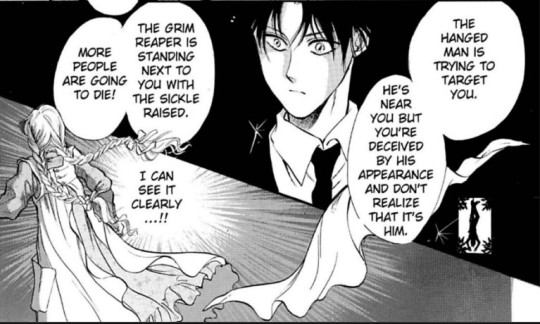
It would be easy to say this was referencing this chapter only but that’s not the case and Mary Weather’s prediction will only become more pertinent as the series goes on.
But before that, the final section of this chapter drives home a point that the previous volume was trying to make as well: self-sacrifice is the truest expression of love. As far as this series is concerned, if you love someone, you'll prove it by dying for them.

The second chapter is the one that really gets to the heart of the series as a whole: Cain, his father, Alexis Hargreaves, and Riff. It's really weird seeing Riff and Alexis speaking with one another amicably and it only gets stranger as Riff learns how cruel Alexis really is. Up to this point, we haven't really had a reason to think much of Riff; he seems loyal to Cain and he seems to be a good butler. That's literally all we know about him. But knowing how loyal he is to Cain only makes it more surreal as he stands by as Alexis whips his child's back. Riff is horrified, of course, but he doesn't really do anything aside from wonder why Cain still thinks his father loves him.
Honestly, I know whipping a child was a far more common punishment at this point in time but considering he's being whipped hard enough it's leaving scars on his back, reminiscent of how brutal a slave's punishment might be around this time period, you'd think Riff would be a little more concerned, especially since we just learned Riff was at one point training to be a doctor.
Of course, there's a possible reason for why he isn't but I'll get back to that around when we get into Godchild....
Anyway, the reason Cain trusts Riff is pretty straightforward: Riff was kind to him when he was a child (he was 12 in this chapter, which would put Riff at 23), he acknowledged his presence when other servants wouldn't, and he swears to stay at his side, always. Cain has no reason not to trust Riff when he's done more for him than any other adult in his life has. I will point out, that while I'm going to assume this changes at some point, as a child Cain seemed to view Riff a bit like a possession, which is a decidedly aristocratic opinion. Riff doesn't do anything to dissuade him of this notion, which seems to indicate they're both very much of their time and status.
Also, Riff was told Cain was somewhat strange by Alexis. When he finally meets Cain, he acts very strangely ("You can see me?") and promptly faints in his arms but this is what he thinks:

You don’t find this strange? XD Twenty-three-year-old Riff wasn’t as with it as present-day Riff....
Now, why does Riff stay with Cain? He's intrigued by him, that much we know for sure, and he wants to care for someone who has been so badly mistreated. Both of these reasons make sense but there is a final statement made by Riff that raises some questions:
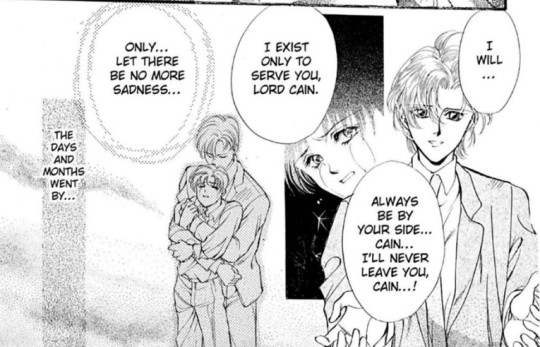
You only exist to serve him? You’ve only met him!
But if you combine it with what Alexis said earlier in this panel here:
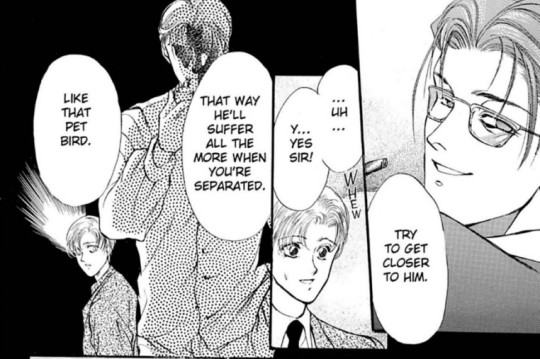
It’s all looking pretty sinister.
At the end of the chapter, Riff accidentally draws a tarot card from Mary Weather's deck. We don't see which one it is (and I can't remember if it's ever revealed) but considering what I do remember about the series I would guess he drew something like The Tower (chaos, destruction, shaken beliefs, etc.) or possibly The Moon (the shadow self, hidden depths, etc.) but that would be with my interpretations of the cards and, as we saw earlier, those do not match up with the manga's. 8D
Now, Cain's father appears to die in this chapter but he, along with Cain's mother, are used as an explanation for why Cain's life is so cursed. In short, Alexis had a wife but the only woman he ever "loved" was his sister, Augusta. He forced himself on her and so she had Cain. The whole ordeal drove her mad and Cain only met her twice in his life at the asylum. The second time she saw Cain drove her to kill herself by jumping through a window because he looked like Alexis. On her deathbed she finally recognized him for who he actually was and she warned him to get away from Alexis, that her death would only make him worse. This is also when Cain realizes the truth of his heritage, which was hinted at pretty strongly this whole chapter:


And this isn't the first time a woman went mad around young Cain. The woman he thought was his mother (Alexis's actual wife) blamed him for his father's distant attitude toward her and she tried to kill him with a scythe. Where did she find a scythe, you ask? I have no idea. Maybe this is the kind of thing people just had on hand back then for the occasional head-lopping. (And yes, I know farmers use them to cut wheat but ... they weren't farmers.)
Present day Cain sometimes sounds a little sexist ("Why do girls love to do such impractical things?") but considering that's about as bad as it ever gets with him and considering how easily his perceptions would have been influenced by his past... I'd say we're doing pretty good.
Now, when Alexis tries to kill Cain for "murdering" Augusta, he makes an interesting remark: "You took the only person I loved from me. Now you'll see what that feels like, Cain!"
He's pointing the gun at Riff, the person he mentioned earlier was the only person who could "tame" Cain. It's pretty early in the series and his words could be meaningless but we already know Cain trusts Riff, so there could be some truth there. His father also says, "You'll go through life unloved and die alone." I suppose we'll see if that turns out to be true or not.
But now we've gotten to see why Cain trusts Riff and, to a lesser degree, why Riff stays at his side despite how dangerous that actually is and we have some very good reasons to dislike Alexis.
The third chapter is ... well, it tells us a little something about Cain, I suppose but it's largely just a murder mystery.
Cain is meeting up with another friend (I honestly don't remember him having this many friends. So far they've all ended up dead or insane, though, so maybe that's why...). This one is named Professor Lambert and his wife dislikes Cain, which seems to just be a common attitude towards Cain as we saw in volume 1. In this case, her issue with him is that his main hobby is the use of poisons, and I guess that is kind of a weird hobby. He's also kind of rude to her to boot, so...
Anyway, her husband, Lambert, makes a comment early on that already had me disliking him:
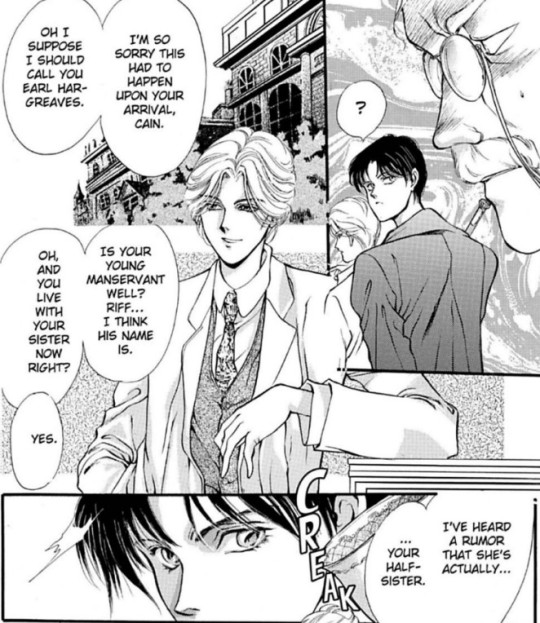
He's awfully cavalier about the fact that the second Cain comes to visit a girl dies. His inquiry about Riff also strikes me as odd; aristocrats did not much care about servants and I doubt they would have been asking about them. This goes to show that Riff is at Cain's side so constantly that to see him without is odd (Riff is largely absent in this chapter). He also asks about Mary Weather. It's noteworthy that Cain doesn't answer any of his questions whatsoever and simply discusses his wife's disliking of him.
Anyway, the theme of this chapter is, once again, perverted love. In this case, Professor Lambert is a pedophile and he's the one who killed the girl at the beginning of the chapter, Elsie. Cain kills him using poison as he explains how he deduced everything and that the only reason he came was because he was hoping Mary Weather could meet Elsie. Apparently, they were friends at some point.
So, Mary Weather now has two dead friends (she doesn't know about this one though) and all of Cain's acquaintances are bad. I'm also not sure how I felt about Elsie's portrayal in this story. Lambert killing her is being framed as definitely bad but their relationship itself is kind of just ... acknowledged, which seems like a weird way of handling something like that.
So, the main thing we’ve learned regarding Cain is he just wants to spoil Mary Weather. He wanted to find her a friend, failed, bought her some kind of present instead. I guess that's nice...?
Also, Cain smokes:
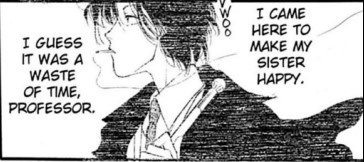
We see more of indulgent/protective big brother Cain in the next chapter. When Mary Weather admits knowledge of a grisly murder and says a servant told her, this is his reaction:

Riff is clearly exasperated; he probably knows Mary Weather is going to find this stuff out regardless, but he'll do as Cain asks. It also begs the question: how many people have been fired for this sort of thing?
As for Cain, he apparently wants to preserve Mary Weather's innocence. Considering his own childhood, I think I understand why.
I think it might be too late, though, judging by the Mother Goose Nursery Rhymes she shares with Cain when he admits no one taught him any (and, you know, the time she spent having to live on her own).
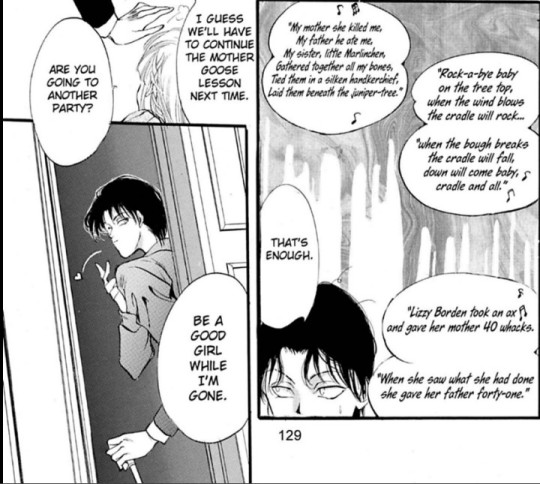
That is the face of a man who is only now realizing children’s stories are deranged.
I feel like Cain is behaving out of character compared to what we saw of him before at the actual ball, though.
There's a woman at the ball he goes to named Gladys who is married. She didn't go to the ball with her husband, so everyone things she's available. Cain knows she's married, she hits on him, and the two go upstairs for some "activities" but she suddenly stops them.

I suppose Cain isn't really protesting exactly; possibly he's trying to warn her about the ignoble nature of other men, but it seems odd to have this after we see how much he didn't push Bibi despite literally paying her for her services:
I don't have a problem with Cain being promiscuous or anything but I think there could have been a better way of demonstrating the fact. This kind of tone is such a typical trope of shoujo manga from the era that I’m not sure if we’re supposed to be reading this deeply into it, however...
But Gladys does explain her behavior regardless and I just ... I'm not sure this is sound logic. XD

I understand wanting to confirm whether you're a sleepwalking murderer, but seducing other men to do it seems like quite the extra mile.
I should probably clarify that the whole dilemma of this chapter is that she does, in fact, think she’s a sleepwalking murderer due to how she keeps hearing a nursery song and then someone winds up dead while she sleeps.
Regardless, Cain gets caught up in the whole thing and gets to know both Gladys and her husband, Radcliff.
...And Cain has gone from seducing the wife to hitting on the husband.

I don't think he's prepared for that, Cain...
Also, Kuroshitsuji has been compared to this series before (and quite understandably) but this panel really drives home the similarities to me:

A young(er) aristocrat, lounging about, as the servant reads off some details about a murder mystery, and they solve it together? The aristocrat comes from a cursed family? The butler is weirdly good at everything? I mean...? Toboso must have read this. The main difference is that while Toboso dances around the dark subjects in her manga (for the most part; certain arcs are more blatant) Kaori Yuki will just flat out tell you all the horrible things happening.
I think this story has the most sympathetic characters so far, though. Gladys and her husband, Radcliff, are both a bit ditzy and a lot of fun because of it. But seeing as this is The Cain Saga no one can remain happy for long. In short, Radcliff was actually the murderer and he did it because he was being confronted by noblemen who had used him in his youth (it's kept somewhat vague but it was almost certain sexual abuse). Gladys is shocked that her husband would kill anyone and because of that short shock/rejection, he kills himself.
I think this is the first time we see Cain actually regret getting involved in a case. He says to Riff: "Everyone has scars that they would rather die than let their loved ones see."
He's speaking of Radcliff's physical scars, of course, but also the emotional ones left from abuse. He is also referring to the exact same duality in himself. He has physical scars but it's the emotional ones he really doesn't want anyone to know about. He understands the pain Radcliff was going through all too well and can see himself in him. He never meant for Gladys to wind up a widow either. He was trying to solve a murder mystery but in this case the men being targeted deserved to die.
I think this is also the first time we see Cain dealing with people that aren't related to him or a previous acquaintance in any way.
The last chapter of this volume is pretty short but it shows us how Cain's extended family dealt with Alexis's death and the fact someone needed to take care of Cain. In short, they dealt with it badly! One of Cain's cousins, Andrew, attempted to kill him the previous night. It came about because Cain overheard he embezzles from the Hargreaves treasury.
However, it turns out it wasn't Cain who died but an unnamed friend of his he'd switched clothes with beforehand.
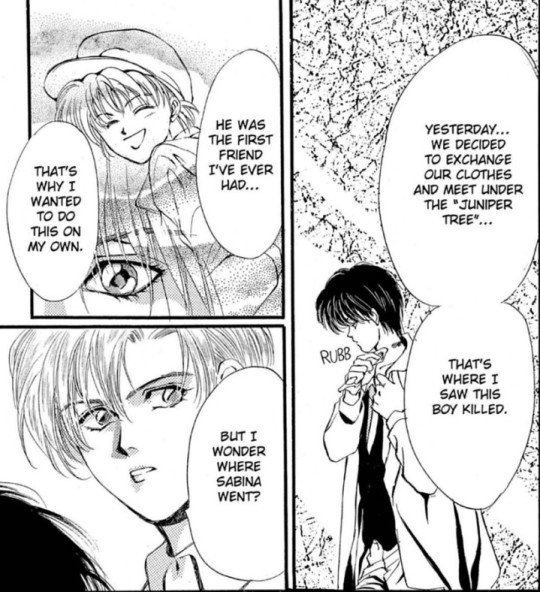
This raises so many questions and no answers are offered. Did he intend for this friend to die? Did he intend to take him from the orphanage and adopt him...? And why is this "first friend" never mentioned again? How did they even meet?
But the woman who killed him is given justice; Cain kills her in turn.
...The aristocracy is unpleasant.
And that wraps up volume 2! I really enjoyed this one. The stories are a lot stronger overall and they all focus on Cain in some way, which makes for a much more consistent tone.
4 notes
·
View notes
Text
The Last Skywalker or Homecoming of the Children or It’s About Family
This is my very own interpretation of the outcome of the Star Wars saga and its wrap-up, after having rewatched the movies twice last year as well as made researches in the web and thought about it for some time.
~~~~~~~~~~~~~~~~~~~~~~~~~~~~~~~~~~~~~~~~~~~~~~~~~~~~~~~~~~
The final battle on Crait in TLJ mirrors, with many visual parallels, Anakin’s assault on the Jedi Temple in ROTS, which had its terrible climax in the annihilation of the Jedi children padawans. In Kylo’s case, the attack is a total failure: the Resistance escapes, and Rey has brought with her the sacred Jedi texts from Ahch-To ensuring that their philosophy will not die.
In the final scene on Crait we see a frame of Kylo’s / Ben’s face which shows the opposite of Anakin / Vader after the battle at the Temple - on his knees instead of standing, bathed in white instead of yellow-reddish light, bare-headed instead of shadowed, his features vulnerable instead of hardened, his eyes directed up at his left instead of down at his right. That this story is going in the opposite direction of the prequels, closing up the saga making a circle and leading Ben Solo to his redemption, is undeniable.
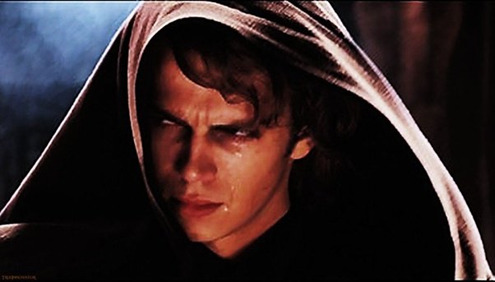
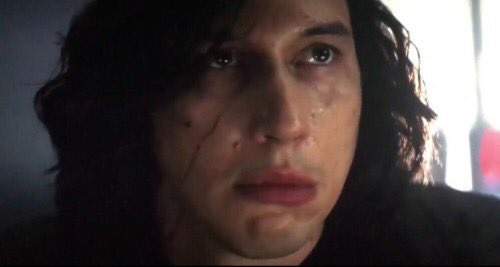
Ben’s anger against his family led to nothing, and he wanted to eliminate Snoke to be free of him, not because he had an ambition for power; he strained for freedom and purpose and belonging with Rey, whom he feels as his equal. But we have already seen that General Hux would not hesitate to kill the new Supreme Leader at the first occasion; so it would not surprise me if the next and last chapter of the saga would begin with an act of state which would disempower Kylo / Ben and force him to flee across the galaxy, kicking over the traces. He killed Snoke to become the master of his own fate at last, thus mirroring and growing beyond Anakin, who had told Padmé he could overthrow the Emperor and rule the galaxy with her but remained Palpatine’s slave until shortly before his death. Both Anakin and Ben are no leaders or governors by nature; as Force users, their task is the galaxy’s spiritual welfare, not its political union. However, this union will not be possible unless the populations know and feel that there is an all-encompassing ideal behind it, that of a Force being and remaining in balance.
Although many fans lamented its seeming lack of purpose, in my opinion Finn’s and Rose’s journey to Canto Bight was pivotal for TLJ. It was important that they meet D.J. and hear his point of view as an outsider, i.e. that war is a dirty business which only makes people rich who have no qualms selling weapons (often to both sides), and that every kind of war is useless in the long run because “you blow them up today, they blow you up tomorrow.”
Even more important, in my opinion, is their encounter with the enslaved children who take care of the fathiers. These children seem insignificant sidekicks, emphasized by the fact that they only communicate with Finn and Rose through gestures and by the end we hear one of them speaking in an alien language; thus, they seem estranged to the story. Nevertheless, in all three scenes when they appear their features are very clearly discernible, including the few seconds when Finn observes them through the binoculars.
The children enjoy the fathier’s liberation because they would love to have the opportunity to run away, too. And the ending scene of TLJ shows that one of these children is a Force user and that he dreams about being a Jedi - a parallel with Anakin, who was a slave himself and dreamt, when he was a child, of being a Jedi and coming to free Tatooine’s slave population. (Another small detail: Cantonica, too, is a planet almost entirely covered in desert.)
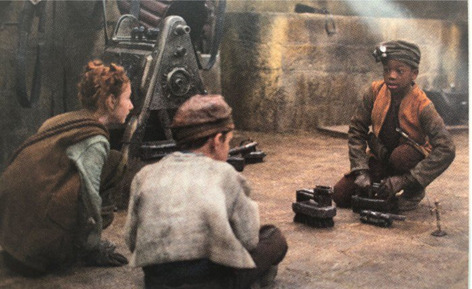
The role of children in Star Wars always is very important. Anakin’s friends on Tatooine were slaves like himself, but the Jedi padawans we see at the temple don’t seem to be in an enviable position either: they are separated from their families at a very young age and taught to learn emotional detachment, since Jedi are not supposed to have close connections. In AotC and RotS we see how the affectionate and protective Anakin cannot endure his isolation, and how his intelligence criticizes the Jedi’s chief interest in politics and their lack of compassion. (As in the classic trilogy, it always comes up to him to speak the disagreeable truths nobody wants to hear.) His attitude results in setbacks and humiliations by the Jedi, who are convinced of being unquestionably in the right. All of this, in a chain reaction beginning with his mother’s cruel and senseless death, leads to his damnation; even though they had no really evil intentions, the Jedi were for a large part responsible for the disaster initiated by the future Emperor and then continued by him and his apprentice, turned into the ruthless Darth Vader.
Anakin’s ultimate moment of damnation is the carnage of the Jedi children, who were completely innocent and who additionally, before he raised his light sabre against them, had approached him with respect and trust, even calling him “master”, obviously not knowing that the Jedi had humiliated him additionally by denying him the title.
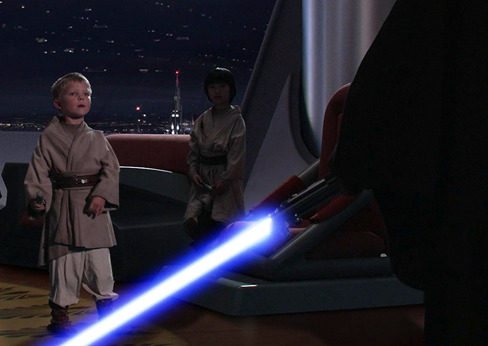
If we now assume that Kylo Ren’s / Ben Solo’s journey is basically an inversion of Anakin’s fate, it seems most logical to me to assume that he will have to meet the Canto Bight children (maybe also other children, but I would assume these, since they were already introduced in detail) and to find his future by bonding with them.
Let us consider his character as we have known him until now. Ben does not seem aggressive and violent in his nature, he has to hide behind Kylo Ren’s mask to do his evil deeds. On Crait he makes a fool of himself; the only successfully cruel act he commits bare-headed is Han’s killing, which he only manages because Han lets him do it, and which traumatizes him to the point that he can’t kill any more except in self-defence. During his interactions with Rey we meet a timid, awkward youngster, who is however also patient (he never gets angry despite Rey’s repeated aggression) and empathic (he is the one who listens to her and supports her after her experience in the Dark Side cave).
Kylo’s / Ben’s personality, like Anakin’s / Vader’s, is torn in two, but the fracture is much less deep, which can also be seen from the names: while Anakin Skywalker and Darth Vader sound perfectly dissimilar, there is not much difference between Kylo Ren and Solo Ben. He is not physically maimed and handicapped like his grandfather, amply shown when he easily takes off his mask, when we see him shirtless, or when he offers Rey his hand - the right one, which distinctively is not a robotic hand. Luke could sense Vader’s inner conflict, proof that this conflict was always there but so deeply buried that only a Force-sensitive close blood relative could feel it; while Kylo’s / Ben’s outbursts of anger show that his own conflict is much more below the surface.
We can only conjecture what led Kylo to kill his own father; Snoke called it a “test” for him, probably threatening to kill Kylo himself if he didn’t commit the deed, but we do sense that there is also some personal reason. When he says to his father that Ben was “a weakling and a fool who deserved to die”, this leads us to understand that he has never learned to accept his introverted, thoughtful and vulnerable nature, even less to value it: Ben is practically his roguish, charming, good-looking father’s opposite. Knowing Snoke, he probably threw salt into Ben’s low self-esteem making him believe that by giving up the name and life of Ben Solo and becoming “the mighty Kylo Ren”, a persona modelled on Vader’s example, he would become someone “strong” as opposite to his attitude towards the Ben Solo persona. For the purpose, Snoke suggested that Ben had to kill his father, of whom he allegedly “has the heart”. But the exact contrary happens: Ben is traumatized by the act and finally understands that Snoke only used him (proving that Han’s words to him were right), destroys Kylo’s mask and never speaks to Snoke or even looks at him again. Allowing Ben to kill him, Han committed his last and most significant act of heroism - forcing his son to look at him while he committed the deed, the horror of which never leaves him again. This closes the cycle to Anakin, who had first become a killer, annihilating the tusken village, after his mother’s senseless death.
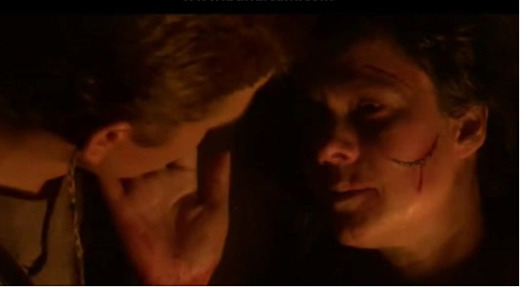
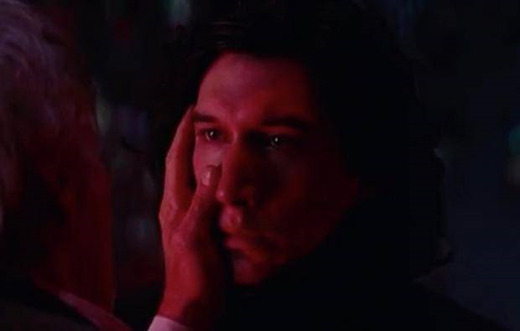
As we know Anakin when he is a child, he is intelligent, fort-right, self-assured and supportive of others. When we see him again in AotC, he is a padawan - frustrated, isolated, suffocated by the Jedi’s expectations and the lack of chances they offer him, and burdened by his master’s lack of faith in him. The child he was seems gone for good. (Another parallel: his son Luke, who had grown up with his aunt and uncle in a normal family until he was about twenty, is a pure, authentic soul full of dreams and ideals, and we even see him play with a toy aircraft in one scene on Tatooine.) We have never seen, until now, a “normal” family with mother, father and children in the saga; our heroes grew up in surrogated families or without one altogether, like in Han’s or Rey’s case. We can only speculate how far Ben Solo’s family was “normal”; their parent’s marriage was difficult, his mother busy with politics, and he was sent to training to his uncle at a young age - we do not exactly know when, but he assuredly wasn’t an adult yet. This is a big hint, for me, that peace throughout the galaxy will be possible if children could grow up in a safe place, well-educated but also loved and respected. The purpose of peace, in my opinion, is always to make the concept of a home possible. Superficially seen, Star Wars is a story of Good and Evil, but it’s not; it’s about Love and War.
At the end of TLJ, Ben is in love with Rey, but his feelings are not requited and now he has no one to whom he can offer them. I believe it would be a godsend for Ben to meet the children and learn to love them and be responsible for them. Among other things this would make him grow and find again the child he once was, the son of Han and Leia who, despite the mistakes they made with him, most certainly loved him. When they meet again in TFA, Leia immediately takes responsibility speaking with her husband, saying that she never should have sent their son away from home. She was convinced that her brother, the Jedi, would protect him, but by now she has understood that in his family sphere he would have been safer from Snoke’s evil influence. At the end of RotJ Luke was already showing the emotional detachment he retained until TLJ; this was, on the long run, neither good for him nor for his pupils. He could teach them the ways of the Force, but his wisdom was not enough to protect them. Tragically, and unknowingly, as a master he had gone a similar path as Obi-Wan and Yoda, who were wise but not truly compassionate because the Jedi ways had taught them to be detached, i.e. not to really care. Luke could not offer his nephew the comfort of a home, and this probably applied to his other students as well. Spiriting a dozen of powerful young men off to a distant planet, away from the happenings in the galaxy and without distinct purpose, and trying to teach them to suppress their emotions, Luke was unwittingly sitting on a powder keg, repeating on a smaller scale the disaster that had been caused by the Jedi Order during the times of the Old Republic. The young man who once was compassion incarnate became, ironically, uncaring precisely due to his commitment to the Jedi rules. Only after being shaken by Rey’s anger and later by Yoda’s advice he finds back to himself one last time and projects his image to Crait in order to rescue his sister and apologize to his nephew, giving up his life in the process.
If there is anything we can learn about the Jedi is that they were no heroes; Luke truly was a hero, but he was not infallible, and his story also teaches that being a hero is not a happy and fulfilling task. As beautiful as the classic trilogy is, it’s a story about longing for the past, about the desire to bring back the “past order”. None of the rebels seems to consider that the old Republic can’t have been all that good if it enabled the rise of the Empire or at least couldn’t foresee it. What the galaxy needs is not the old, but a new order, and children are demonstrative of a fresh and better start.
Ben Solo is the last from the Skywalker blood, and the Skywalkers are notoriously family men: Anakin wanted nothing more than a home. He got mad with grief when his mother died, he married although he was not supposed to, and the day Padmé told him that she was pregnant he declared that it was the happiest day of his life. Luke himself, even before knowing so, always did anything he could and ignoring the risks, to save and keep his family together (his sister, his father) and adding to it (befriending Han, who by marrying Leia became his brother-in-law). It’s when the Sykwalkers are united as a family that the galaxy is at peace. Ben has turned his back on his family feeling rejected and betrayed; all we see him do with the First Order’s means has only one aim, finding Luke and confronting him with all of his pent-up anger. So we can assume that he is not cold towards his family but on the contrary feels a lot for it, else he would not be so frustrated and disappointed. But by the end of TLJ Luke as well as Han’s dice, his last keepsake, have dissolved; a sign that his anger has literally gone up in smoke.
We have heard repeatedly the opinion other people had of Ben: his parents and his uncle feared that he might be or become like Vader, Snoke accused him of having his father’s heart… but in my opinion, Ben shows his Skywalker blood most by having, like all of them, his mother’s heart. In TESB Han pointed out that Leia would not be so angry with him if she didn’t care; and it was always she who comforted the others when they were hurt or traumatized. Ben killed Snoke in cold blood, but his extremely aggressive demeanour against Luke shows that he still cares a lot about his uncle; and in the scenes with Rey we have repeatedly seen his underlying compassionate nature. Although he is raw and immature, we feel his mother’s passionate heart in him. He has his father’s shrewdness at times, but the way he feels comes all from Leia.
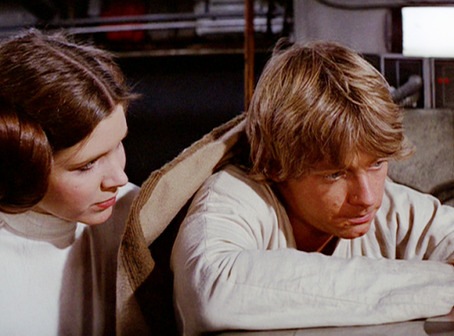
Once again, the saga’s love for figurative speech helps us, emphasizing the theory of Ben Solo’s redemption: at the beginning we met a child who had no father, and the young man who is his reincarnation is the only one whose sword has the form of a cross. I do not doubt that Ben Solo will indeed “finish what his grandfather started”, as he had promised. He is the Chosen One now, Anakin being dead. That is also the main reason why I’m sure Ben will not die in the end: in Darth Vader we already had a figure who died for his sins and it would be unoriginal, mildly speaking, to simply go there again. But most importantly, Vader had left something good in the galaxy in form of his two children. If Kylo / Ben dies, the power he has inherited from his grandfather, his loving upbringing by his parents and the teachings from his uncle will all be gone with him, too: which would mean that the Skywalker family was begotten only to bring death and terror to the galaxy. This family was always meant to bring peace and stability, but it was often prevented from doing so by influences stronger than them.
The last Skywalker is now free from all outward influence - Snoke, his father, his uncle; and he has no past sins to repair for but his own, differently from Luke who spent the rest of his life trying to atone for Vader’s crimes. Ben finally has the freedom to make his own choices and to go his own way; he is the last Skywalker, but he is also the first who must learn to live without a father figure. In theory, he could now go anywhere: Snoke (albeit not voluntarily) left him his power, Luke his knowledge, Han his love.
Many viewers are of the opinion that Kylo Ren can’t hold a candle to Darth Vader in his villainous role. But this is deliberate: the tormented galaxy does not need another Vader. When the saga began, the central figure was Darth Vader, the Dark, the Evil Father; yet as we meet him when he is a child, he is the Good Son. When we first see Kylo he is the Evil Son; so narratively, I assume that his goal is that of becoming the Good Father. With a family of his own, the last Skywalker would finally find his balance and thus, bring peace to the galaxy.
On a side note, Ben may have an encounter with his grandfather aided by the Force, in order to get to know him how he truly was: an affectionate, protective person whose alleged “power” as Darth Vader hid the tragedy of a torn soul and dismembered body.
I am not quite certain about the galaxy’s political goal, but I would suggest that the only viable solution would be through matriarchy; the few working political systems we briefly know of are Naboo under Padmés rule and Alderaan under Breha’s, both of whom queens. In any case, none of them was a Force user; they did not reign using the Force the way Anakin / Vader / Kylo wanted. But not being Force users, they had never been padawans: thus they had not learned their caring and responsible attitude from the Jedi.
Ben Solo is by now the only known person in the galaxy who was actually trained in the ways of the Jedi and also knows the Dark Side. (In theory there are also the Knights of Ren, but their destiny is unknown as of yet.)
I believe it will be Ben’s task, together with Rey who is his equal in the Force, to find and keep a new and better balance in the Force without suppressing the Dark Side, and growing Force-sensitive children in a more natural way; not separating them from their families (respectively giving them one in case they don’t have it), not teaching them emotional detachment but compassion, and leaving them the choice as to whether they want to become Jedi or not. (Keep in mind: the Skywalker men from all three generations had the ambition of becoming pilots, and were pushed into becoming Jedi because it seemed to be the right thing for them. None of them actually wanted or ever was happy with being a Jedi.)
Most viewers were irritated on first seeing Kylo’s face without the mask: the reason for that being that his looks are diametrically opposite to Vader’s, he inspires trust and sympathy instead of fear. My assumption is that Ben would win the children’s confidence easily, and that his connection with them would lead to his salvation. Also, the girl he loves and whom he saw as “his” right from the beginning is someone who desires nothing more than a family, which would give both of them what they truly need - a home, and a sense and purpose in life. This would at last put an end to one of the central rules of the Jedi Code, which is that they are not supposed to marry and have families of their own. Ben Solo is the father figure the Skywalker family, and with him the whole galaxy, has been waiting for.
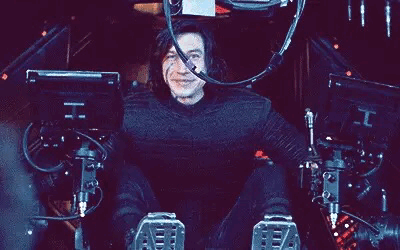
Carrie Fisher, whenever she was asked why she thought the saga was so loved, allegedly always answered “It’s about family.” This is perfectly true: the importance of an intact family where children can grow protected and loved is perhaps the most crucial theme of the entire story. And what makes Ben’s and Rey’s relationship so touching and inspires so many people to think and dream about them is that we instinctively feel why they fit so well: officially they impersonate Dark and Light side of the Force, but deep down they both are lost children, who desperately wish for nothing more than a home.
The technical preliminaries fit to this theory, too - George Lucas is father or three adopted children himself, and he sold the rights to the third trilogy of the saga to Disney, a production firm that knows like no other how to tell family stories and happy endings.
Narratively, it would close the circle with the other third chapters of the saga, which also deal with a return, a reckoning: after the revenge of the Sith and the return of the Jedi, now it would be time for the ones who are neither one nor the other to have a chance.
I am quite certain Ben and Rey two are meant to be together, but not on their own. Their task is to start another Skywalker story, one that is about love and not power. Ben and Rey are the beginning of the new Skywalker family, one to which everyone is invited, boy or girl, from a good family or poor and abandoned, Force-sensitive or not; the Canto Bight children are only the beginning. The “Reylo” love story so many fans are imagining these days is, in my opinion, a red herring just as Rey’s family background was in TFA, when after all of the speculating and fantasizing whose child she was, she turned out to be an absolute nobody. Her name was a dead giveaway, by the way - “Rei” in Japanese means “zero”. I know more than one Japanese manga or anime where the protagonist is named Rei which hints at her not having a belonging or family, and having to find her place in life through her own abilities and the friends she makes.
Ben’s name makes things clear, too: he bears the name Obi-Wan assumed while he was in exile; Obi-Wan / Ben was a Jedi, a mentor and a father figure, so now it’s up to Ben Solo to pick up this task.
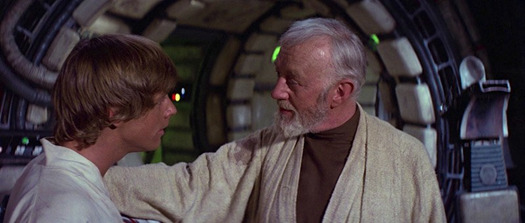
The relationship between Ben and Rey will not lead to a grand romance but to their “place in all this”: as mother and father. The authors are drawing wool over our eyes to keep up the suspense and make us imagine all sorts of romantic outcomes, or terrible retaliations in store for Kylo / Ben, instead of the obvious truth staring in our faces.
Anakin never found another home after he had to leave his mother on Tatooine. His marriage to Padmé was secret, so they could never share a home together and present themselves in public as husband and wife. His children never knew him the way he was; and later they didn’t talk to anyone about him, Ben learned only at age 23 that the infamous Darth Vader was actually his grandfather. Luke had forgiven him and called him “father”, but even he didn’t accept the truth of his heritage, he tried to amend for the evil his father had done, but never learned about the good man he had once been. As for Leia, who had been imprisoned and tortured by him, she probably never wanted to waste a thought on him.
But Ben, who is Anakin’s reincarnation, reinstalled his place in the family the moment he called him “grandfather” in TFA. And if he manages to have a family in the end, Anakin, too will at last have come home again.
This is what I think the scene at the ending of TLJ is anticipating: we see the Force-sensitive boy sweeping the platform in front of the stables and then dreaming about being a Jedi, lifting the handle of the broom which in the starlight begins to gleam like it was a light sabre. The platform recalls a stage, and the little boy is not dreaming but, effectively, playacting.
Message received: free the stage, it’s time for us - the galaxy’s children.
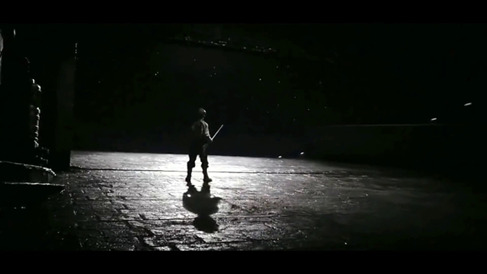
#star wars#episode IX#speculation#anakin skywalker#ben solo#kylo ren#padme amidala#leia organa#darth vader#canto bight#ben kenobi#luke skywalker#jedi order#reylo#bendemption#save ben solo#read more
20 notes
·
View notes